Vetted
14 Best Waldorf Parenting Books Every Parent Should Read
Wander into the world of Waldorf parenting with these 14 essential books, unlocking secrets to harmonious and holistic child-rearing.

Exploring Waldorf parenting books **offers** stellar tips for moms and dads. **”Simplicity Parenting”** advises ditching clutter for more peace. **”You Are Your Child’s First Teacher”** encourages natural growth and solo play. **”Waldorf Parenting Handbook”** blends practical advice with profound insights. **”Walking with Our Children”** provides nurturing wisdom. **”Waldorf Education: A Family Guide”** includes detailed data on child development. **”Simple Parenting”** emphasizes confidence and collaboration. **These books show** Waldorf principles, creating a nurturing environment for your child’s growth.
Key Takeaways
- Practical advice for simplifying parenting in a consumerist society.
- Valuable insights and friendly suggestions for parenting.
- Detailed resource with articles by Waldorf experts.
- Insightful parenting method emphasizing confidence and cooperation.
- Wise guidance for fostering child's growth.
Simplicity Parenting: Using the Extraordinary Power of Less to Raise Calmer, Happier, and More Secure Kids
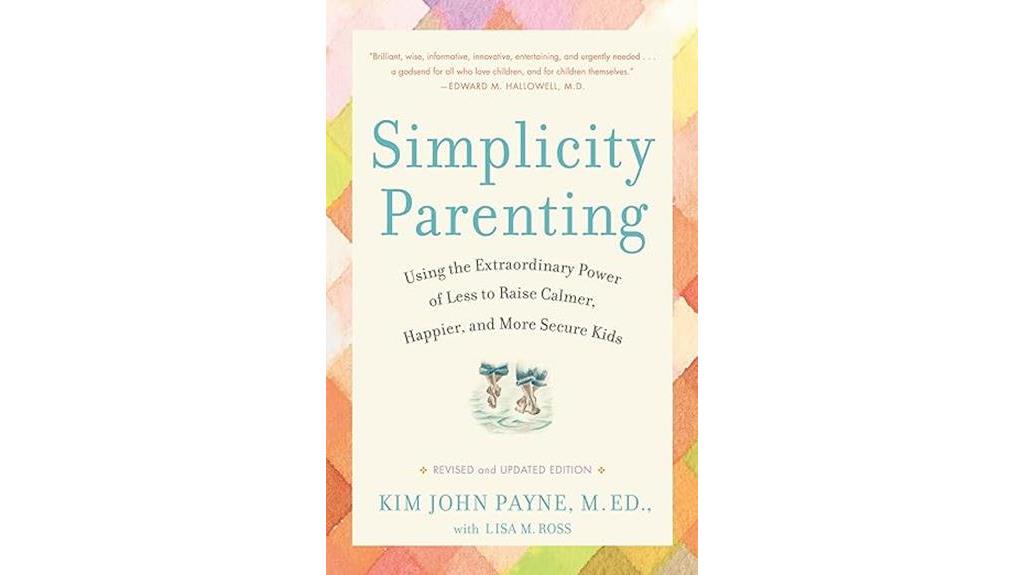
For parents seeking a practical guide to simplify their parenting approach and nurture calmer, happier, and more secure children, 'Simplicity Parenting: Using the Extraordinary Power of Less' is a highly recommended choice. This book serves as a valuable reminder in a society driven by consumerism, emphasizing the benefits of simplification for a more peaceful existence.
Its well-written content offers inspiration and actionable advice for raising children who are calmer, happier, and more secure. Readers appreciate the book's relevance in today's fast-paced world, finding it easy to understand and implement.
By providing a blend of big-picture concepts and practical strategies, 'Simplicity Parenting' has been hailed as revolutionary and transformative by some. While criticisms mention the book's length and the need for more age-specific information, the overall impact is positive, with readers finding strength, inspiration, and a renewed focus on what truly matters.
Best For: Parents looking for a practical and inspiring guide to simplify their parenting approach and raise calmer, happier, and more secure children.
Pros:
- Offers practical advice for simplifying parenting in a consumerist society.
- Well-written content that is easy to understand and implement.
- Provides a blend of big-picture ideas and actionable strategies for parents.
Cons:
- Some readers found certain metaphors confusing.
- Lack of age-specific information for practicality.
- Criticisms about the lengthiness of certain topics.
A Childs Seasonal Treasury, Education Edition
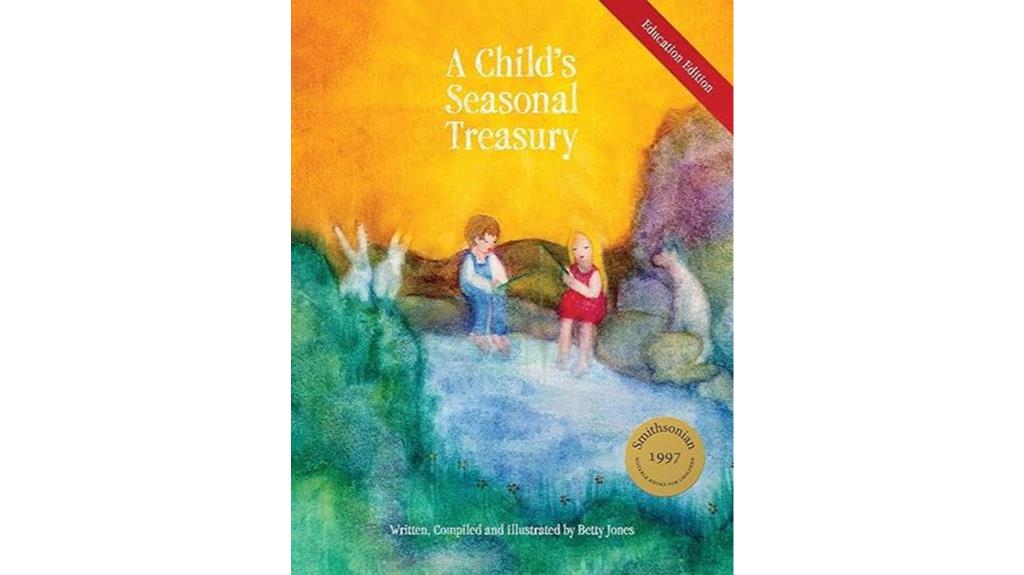
Parents seeking a thorough resource for incorporating Waldorf-inspired learning into their kindergarten and first-grade children's education will find 'A Childs Seasonal Treasury, Education Edition' to be a valuable addition to their home library. This book offers a treasury of seasonal songs, poems, and handcrafts, making it a great resource for enhancing daily circle time and fostering a Waldorf-inspired educational experience.
Featuring seasonal poems, songs, crafts, art, recipes, and stories, it provides a holistic approach to learning. While some mixed reviews mention concerns about the lower quality of the education edition and the inclusion of a cookbook, the practicality and usability of the book are highlighted by its organization by season and an all-year-round section.
Overall, 'A Childs Seasonal Treasury, Education Edition' is praised for its content and ideas for spending quality time with children.
Best For: Parents seeking a comprehensive resource for incorporating Waldorf-inspired learning into their kindergarten and first-grade children's education.
Pros:
- Treasury of seasonal songs, poems, and handcrafts
- Suitable for parents and children
- Organized by season with an all-year-round section
Cons:
- Disappointment with the inclusion of a cookbook
- Concerns about the lower quality of the education edition
- Playdough recipe not suitable for gluten-free families
You Are Your Child's First Teacher, Third Edition: Encouraging Your Child's Natural Development from Birth to Age Six

The 'You Are Your Child's First Teacher' book series is a valuable resource for those seeking to understand and support natural child development from birth to age six. This book is praised for its friendly suggestions, examples, and useful resources that make it easy to read and comprehend.
It takes a common-sense approach to parenting, offering instructive guidance on childhood development. Readers have found that it validates their parenting actions and provides insights into child development, encouraging independent play.
The book emphasizes the importance of letting children enjoy their childhood at their own pace, making it a recommended read for all parents. It's considered a must-have for those interested in Waldorf education, contributing to more harmonious and joyful homes.
Best For: Parents looking for practical guidance and insights into supporting natural child development from birth to age six in a holistic manner.
Pros:
- Valuable insights and friendly suggestions for parenting.
- Easy to read and comprehend with memorable information.
- Encourages independent play and emphasizes the importance of children enjoying their childhood at their own pace.
Cons:
- Some readers may perceive a subtle push towards Waldorf education.
- Lack of scientific detail may be a concern for some.
- Discussion of immunization practices in relation to education may not align with everyone's views.
Waldorf Parenting Handbook
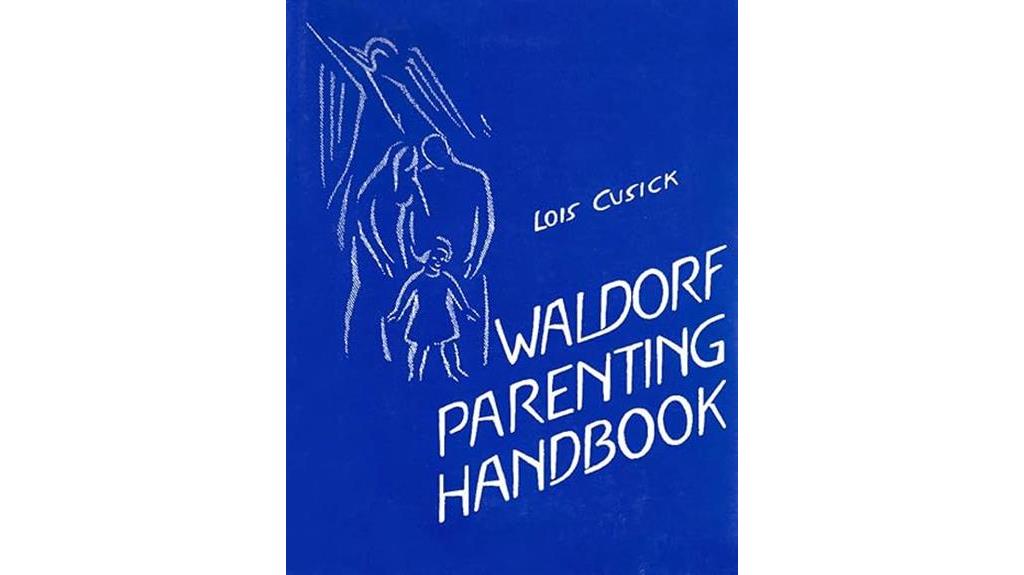
When exploring Waldorf education and philosophy in a straightforward manner, the 'Waldorf Parenting Handbook' serves as an excellent starting point for newcomers. This handbook provides thorough and detailed information about Waldorf education and philosophy, making it a great resource for those looking to understand the basics before delving into more complex texts by Steiner.
It offers practical guidance on how parents can implement Waldorf principles at home, emphasizing the importance of supporting children's development in a holistic way. The handbook covers a wide range of topics, from reading instruction methods to child development from conception through adolescence.
With its extensive coverage and easy-to-understand content, the 'Waldorf Parenting Handbook' is a valuable tool for families new to Waldorf education seeking to nurture their child's growth effectively.
Best For: Parents new to Waldorf Education seeking practical guidance and detailed insights into child development.
Pros:
- Provides practical and philosophical information on Waldorf Education.
- Offers detailed insights into child development and nurturing individual growth.
- Addresses common questions and clarifies Waldorf Education practices.
Cons:
- Raises concerns about the statement regarding dyslexia prevention.
- Emphasizes the importance of ensuring teachers are knowledgeable about effective teaching methods.
- May not delve deeply into some technical aspects of Waldorf philosophy.
How to Stop Losing Your Sh*t with Your Kids: A Practical Guide to Becoming a Calmer, Happier Parent

Traversing the turbulent waters of parenting can be a demanding journey, but 'Waldorf Parenting Books' offers a rejuvenating perspective on maintaining composure and fostering a happier parent-child relationship.
'How to Stop Losing Your Sh*t with Your Kids: A Practical Guide to Becoming a Calmer, Happier Parent' stands out for its relatable and humorous approach. The author's use of memorable acronyms like FART and BuRP adds a light-hearted touch to the content, making it easier for parents to internalize the advice.
Readers appreciate the book's conversational tone, which creates a sense of understanding and compassion. By focusing on helping parents manage their reactions rather than solely targeting their children's behavior, this book empowers parents to navigate challenging situations with more ease.
Overall, 'How to Stop Losing Your Sh*t with Your Kids' provides practical strategies for self-improvement and fostering a positive parent-child dynamic.
Best For: Parents seeking a humorous and practical guide to managing their reactions and fostering a positive relationship with their children.
Pros:
- Offers relatable and humorous advice that is easy to understand and implement.
- Focuses on empowering parents to improve their own reactions rather than solely focusing on changing children's behavior.
- Provides practical strategies for self-improvement and enhancing the parent-child dynamic.
Cons:
- Lack of representation of men in the parenting narrative.
- Some readers find the language towards children disrespectful.
- May not resonate with those looking for a more traditional parenting approach.
Simplicity Parenting: Using the Power of Less to Raise Happy, Secure Children
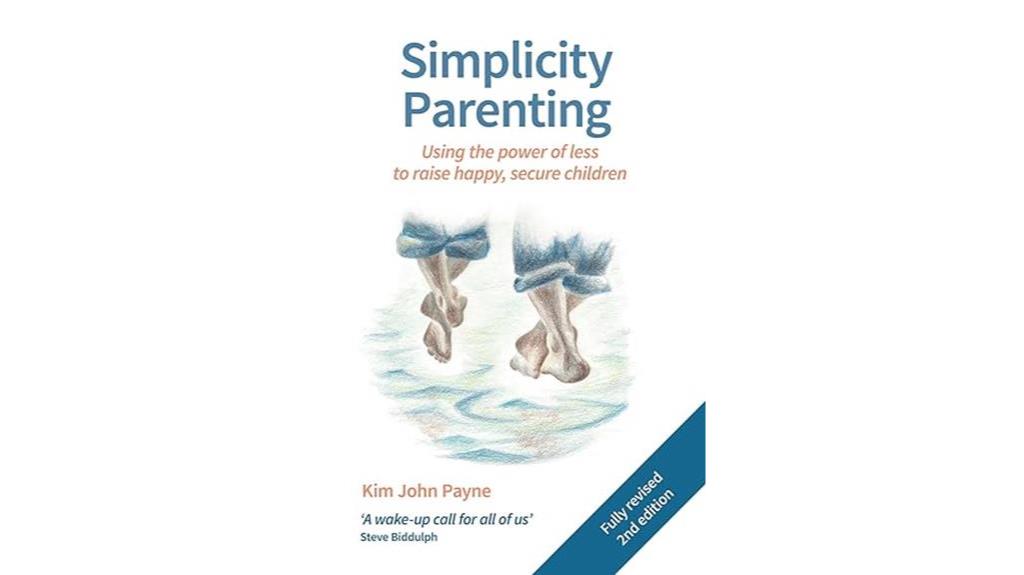
Ideal for parents seeking a mindful and holistic approach to raising children, 'Waldorf Parenting Books' offer valuable insights and practical strategies for nurturing happy, secure kids.
One standout book in this category is 'Simplicity Parenting: Using the Power of Less to Raise Happy, Secure Children' by Hawthorn Press Early Years. This must-read provides practical strategies for parents facing the challenges of raising children in today's fast-paced world.
Emphasizing the significance of slowing down and prioritizing family time, the book offers valuable reminders on creating a balanced environment for children.
Additionally, it's particularly beneficial for parents of children with special needs, providing tailored guidance and support in fostering a secure and happy upbringing.
If you're looking for a resourceful guide to simplify parenting and enhance your child's well-being, this book is a valuable addition to your reading list.
Best For: Parents looking to simplify their approach to raising children, especially those seeking practical strategies and insights for creating a balanced and secure environment for their kids.
Pros:
- Offers practical strategies for navigating the challenges of parenting in a fast-paced world.
- Emphasizes the importance of family time and creating a nurturing environment for children.
- Tailored guidance and support for parents of children with special needs.
Cons:
- May not provide in-depth solutions for complex parenting issues.
- Some strategies may not be applicable to all family dynamics.
- Requires consistent effort and commitment from parents to implement the suggested practices effectively.
Walking with Our Children: The Parent as Companion and Guide
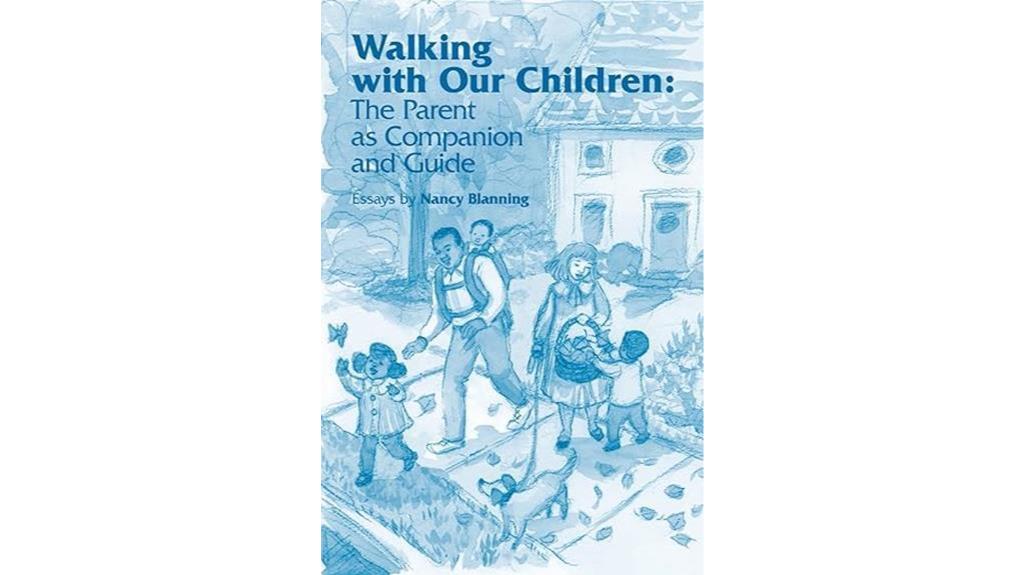
For parents seeking wise and kindly guidance in fostering their child's growth and well-being, 'Walking with Our Children: The Parent as Companion and Guide' from the Waldorf Parenting Books series is a valuable choice. This book emphasizes the importance of applying basic principles to a child's environment to help them thrive.
It offers practical parenting advice that encourages parents to let go of adult agendas in order to support their children effectively. Readers have recommended this book for its valuable insights and sweet illustrations that make the content more engaging.
By following the advice presented in 'Walking with Our Children', parents can learn how to become companions and guides to their children, creating a nurturing and supportive environment for their growth and development.
Best For: Parents seeking practical and wise guidance in fostering their child's growth and well-being.
Pros:
- Emphasizes the importance of applying basic principles to create a thriving environment for children.
- Offers practical parenting advice that encourages letting go of adult agendas for effective support.
- Contains valuable insights and engaging illustrations recommended by readers.
Cons:
- May not provide in-depth coverage of specific parenting challenges.
- Some readers may find the advice too idealistic for their parenting style.
- Limited focus on addressing behavior management strategies.
Being at Your Best When Your Kids Are at Their Worst
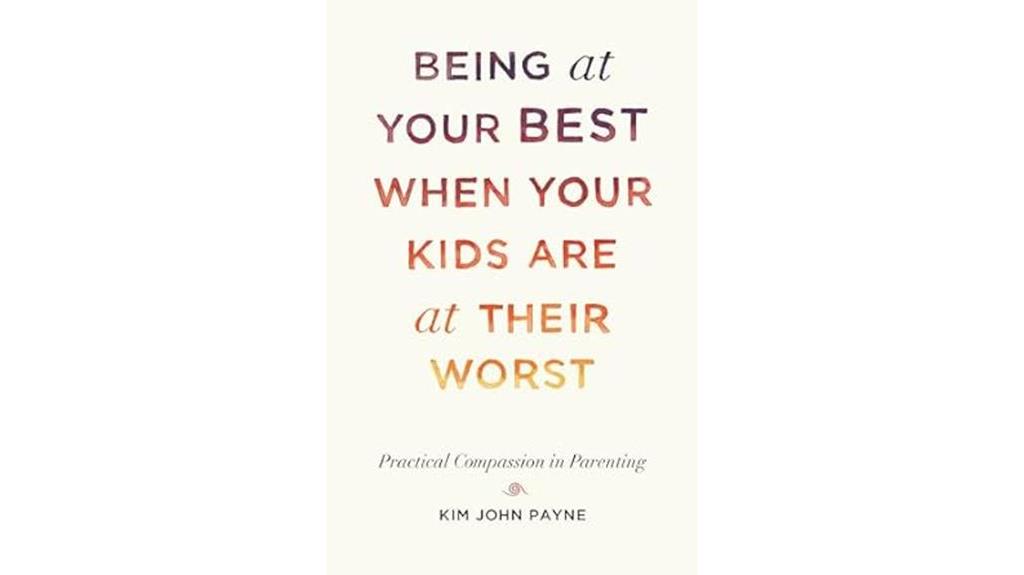
When seeking practical and engaging guidance on maneuvering through challenging parenting moments, Waldorf Parenting Books offer valuable insights and techniques. Positive reviews and testimonials highlight readers' gratitude for the book's practical advice, praising its concise and helpful nature.
However, critiques point out limitations such as the book not addressing children with specific attachment issues and its one-size-fits-all approach. Despite this, the book's content overview showcases tools for de-escalating family problems and enhancing parenting skills.
Personal transformations and improvements in parenting techniques are noted through testimonials, emphasizing positive changes in discipline methods and fostering a more peaceful parenting atmosphere. General recommendations suggest sharing the book with others for its valuable insights and practical advice, despite some room for improvement in acknowledging the diversity of children's needs.
Best For: Parents looking for practical and concise guidance in handling challenging parenting situations with a focus on personal growth and positive transformation.
Pros:
- Practical and applicable advice for parenting techniques.
- Engaging and easy-to-follow content.
- Positive impact on family dynamics and discipline methods.
Cons:
- Lack of addressing specific attachment issues in children.
- One-size-fits-all approach may not suit all parenting styles.
- Room for improvement in acknowledging the diversity of children's needs.
The Waldorf School Book of Soups (Waldorf Cookbooks)
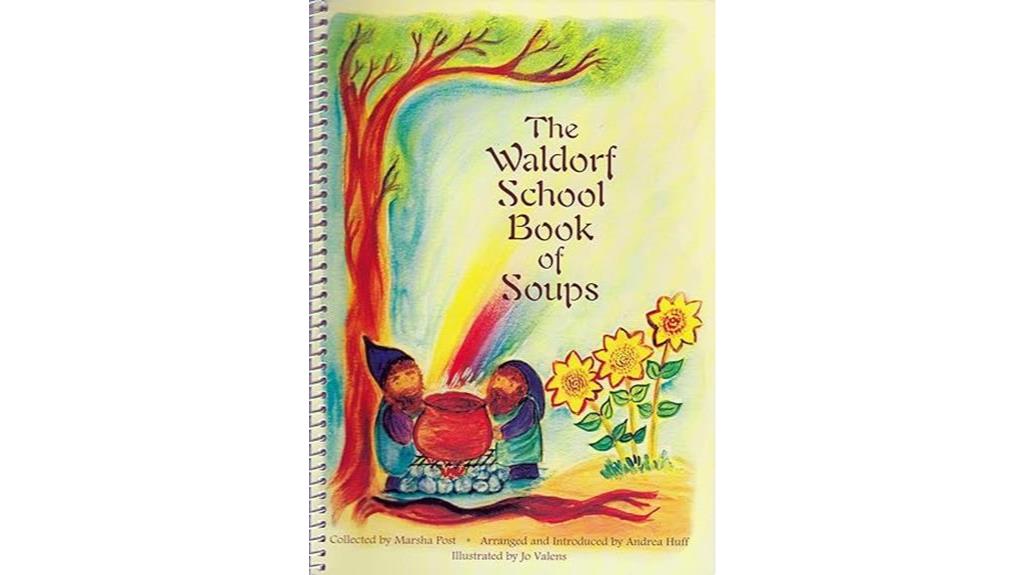
With a focus on family-friendly recipes loved by parents and children alike, 'The Waldorf School Book of Soups' stands out as a must-have for those seeking a cookbook that promotes healthy eating habits.
This compact yet content-rich book offers a variety of inspiring recipes that have become favorites in many households. Specific recipes like Stone Soup come highly recommended, adding to the book's appeal.
Families find themselves reaching for this book as often as any other cookbook, appreciating its warmth and comforting feel. Recommended for those who enjoy cooking with children and families aiming to eat healthily, this book has garnered positive reviews for its quality and content.
Despite not being spiral-bound as advertised, users express surprise at how frequently they utilize the recipes it offers, making it a valuable addition to their culinary repertoire.
Best For: Those who value family-friendly recipes, enjoy cooking with children, and are looking to promote healthy eating habits in their households.
Pros:
- Contains a variety of inspiring and loved recipes for parents and children.
- Compact yet content-rich, offering a pleasant cooking experience.
- Highly recommended for families aiming to eat healthily.
Cons:
- Not spiral-bound as advertised.
- Limited information on the book's actual size and layout.
- Some users may find the book's content too specific to certain recipes.
The Waldorf Kindergarten Snack Book (Waldorf Cookbooks)
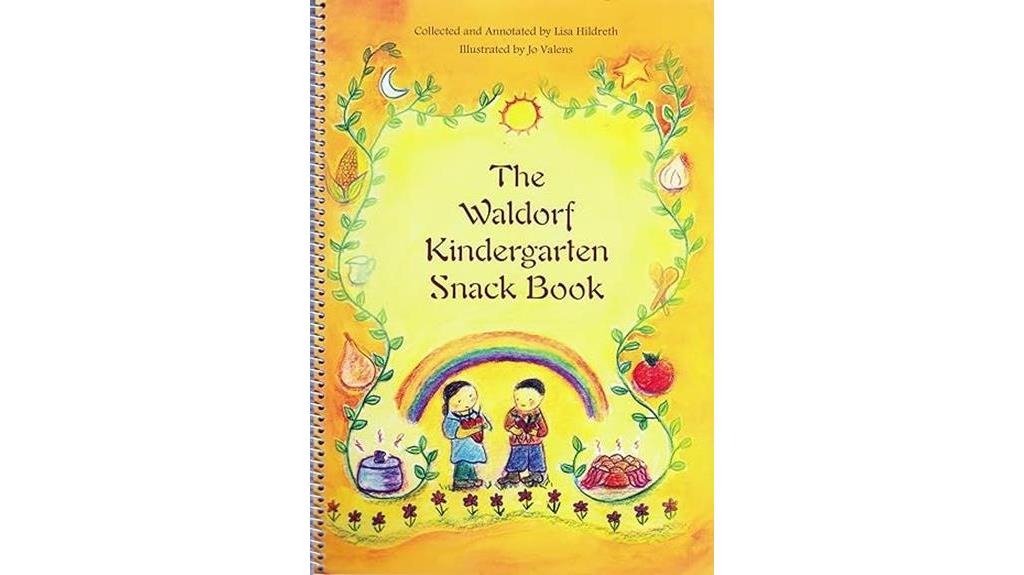
The Waldorf Kindergarten Snack Book from the Waldorf Cookbooks offers a variety of healthy snack ideas suitable for families with dietary restrictions or seeking allergen-free recipes. Positive reviews highlight the book's appeal to both children and adults, with clear and easy-to-follow recipes. It's praised for including egg-free and dairy-free options, making it suitable for households with food allergies.
While some appreciate the opportunity to personalize recipes, others note inaccuracies in measurements and baking times. The book contains wheat-free and allergen-free recipes, though some may need adjustments for gluten-free diets. Mixed reviews mention the book's value as a resource for healthy snacks, with some disappointed by the lack of fruit and vegetable recipes.
Overall, opinions vary on the book's content and its worth in relation to price and quality.
Best For: Families seeking healthy snack ideas with allergen-free options and dietary restrictions.
Pros:
- Offers a variety of healthy snack ideas appealing to both kids and adults.
- Includes clear and easy-to-follow recipes with egg-free and dairy-free options.
- Contains many wheat-free and allergen-free recipes suitable for households with food allergies.
Cons:
- Inaccuracies in measurements and baking times noted by some readers.
- Lack of fruit and vegetable recipes criticized by a portion of users.
- Mixed opinions on the healthiness and quality of the recipes provided.
Bringing the Best Out in Boys: Communication Strategies for Teachers
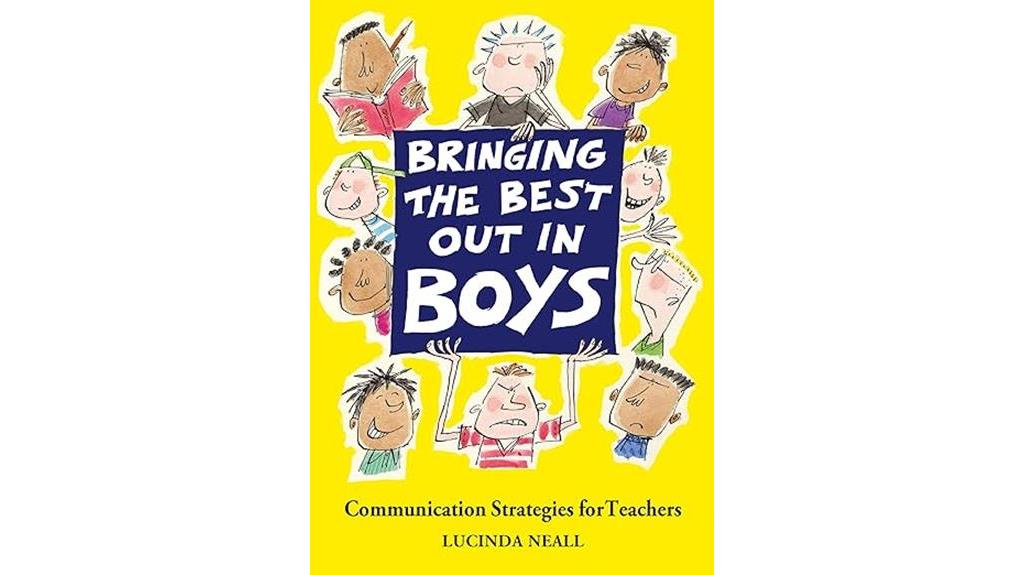
For parents and educators looking to enhance their communication skills with boys, 'Bringing the Best Out in Boys: Communication Strategies for Teachers' from the Waldorf Parenting Books collection is an invaluable resource. This book has received high praise for its practical advice and clear writing style. Readers have found it to be a great aid for those dealing with boys, offering effective strategies for communication.
The book's content satisfaction is evident, meeting expectations and proving suitable for individuals interested in the field. Additionally, the condition and delivery of the book have been satisfactory, with prompt shipping and appropriate packaging.
Its usefulness and relevance shine through with reminders on supporting children, particularly boys, and providing guidance on effective communication strategies. Many express gratitude for the book meeting their needs and appreciate its relevance in their work with boys.
Best For: Parents and teachers seeking practical advice and effective communication strategies for interacting with boys.
Pros:
- Well-written and clear with good advice.
- Highly recommended and worth the price.
- Provides valuable strategies for understanding and guiding boys.
Cons:
- May focus primarily on boys, potentially lacking insight for other genders.
- Condition of the book may vary, with some copies appearing well-used.
- Limited in scope, focusing specifically on communication strategies for boys.
Waldorf Education: A Family Guide
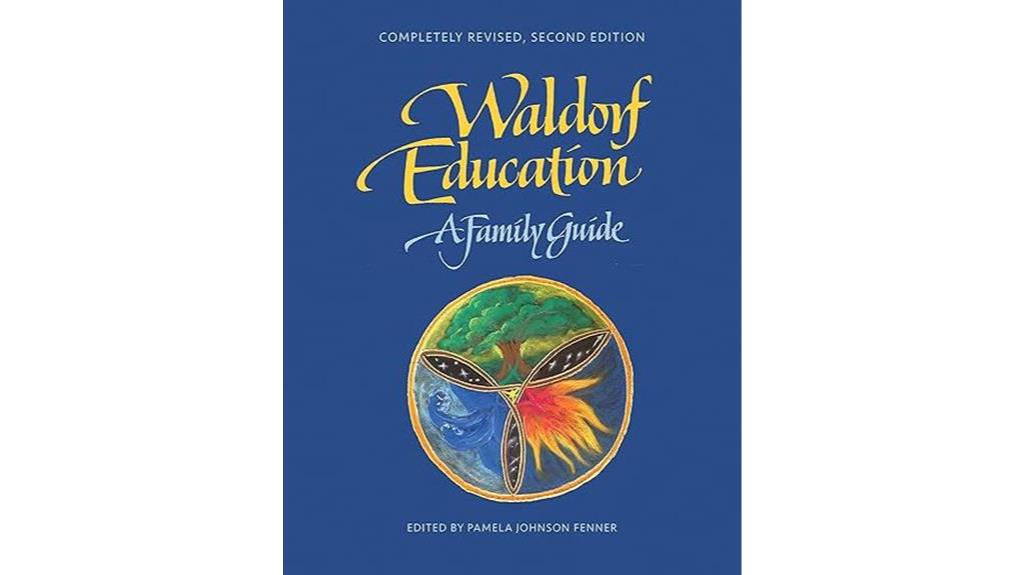
Ideal for parents seeking a thorough overview of Waldorf education, 'Waldorf Education: A Family Guide' offers insights from a diverse range of contributors. With over 88 articles written by more than 65 Waldorf teachers, administrators, and parents, this guide is a detailed resource divided into eight chapters covering various aspects of Waldorf education.
Each article, condensed to two to four pages, provides accessible information on topics such as child development, classroom activities, and global experiences within Waldorf education. Edited by Pamela Fenner, the guide has been praised as essential reading for new parents in Waldorf schools and is considered a treasure for both parents and teachers.
While some critique the guide for disconnected articles and lack of practical guidance, it remains a valuable tool for families exploring Waldorf education.
Best For: Parents new to Waldorf education seeking a comprehensive and diverse overview of the principles and practices in Waldorf schools.
Pros:
- Detailed resource with over 88 articles by Waldorf experts.
- Condensed articles for easy accessibility and understanding.
- Provides insights on child development, classroom activities, and global experiences within Waldorf education.
Cons:
- Some readers find the articles in the guide disconnected.
- Lack of practical guidance for parents may be disappointing for some.
- Calls for improvement in writing and coherence of the articles have been noted.
Waldorf Education: A Family Guide
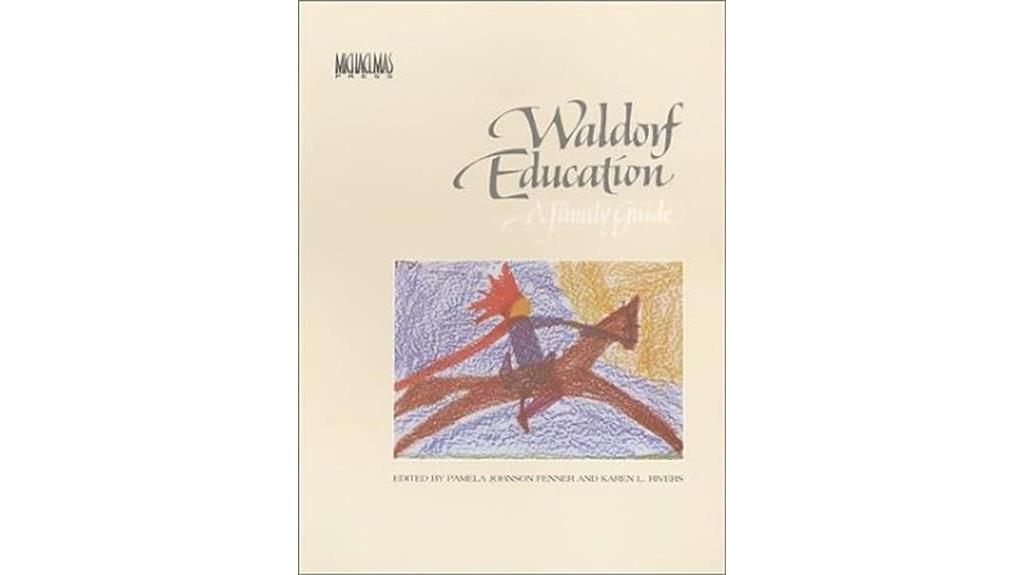
Highly recommended for those seeking an introduction to Waldorf education, this book offers inspiring ideas and a broad perspective on the philosophy behind it. 'Waldorf Education: A Family Guide' serves as a valuable resource for beginners, providing a well-written overview of the basic principles of Waldorf education.
Written by multiple authors, the book explores the philosophical foundations of Waldorf education, examining the New Age philosophy of Rudolf Steiner. It distinguishes Waldorf education from traditional Christian beliefs and compares it to other educational methods. While appreciating elements like arts, nature, and practical skills, the book also raises concerns about potential misalignments with certain belief systems.
User experiences highlight the book's role in guiding families interested in Waldorf education, particularly in homeschooling and school environments.
Best For: Families interested in exploring Waldorf education principles and activities with children.
Pros:
- Provides a comprehensive introduction to Waldorf education philosophy.
- Offers inspiring ideas for activities and approaches to engage children.
- Well-written and easy to read, suitable for beginners in Waldorf education.
Cons:
- Emphasizes New Age philosophy of Rudolf Steiner, potentially conflicting with traditional Christian beliefs.
- Raises concerns about occult teachings associated with Waldorf education.
- May not appeal to individuals seeking a strictly secular educational approach.
Simple Parenting: Raising Confident and Cooperative Kids
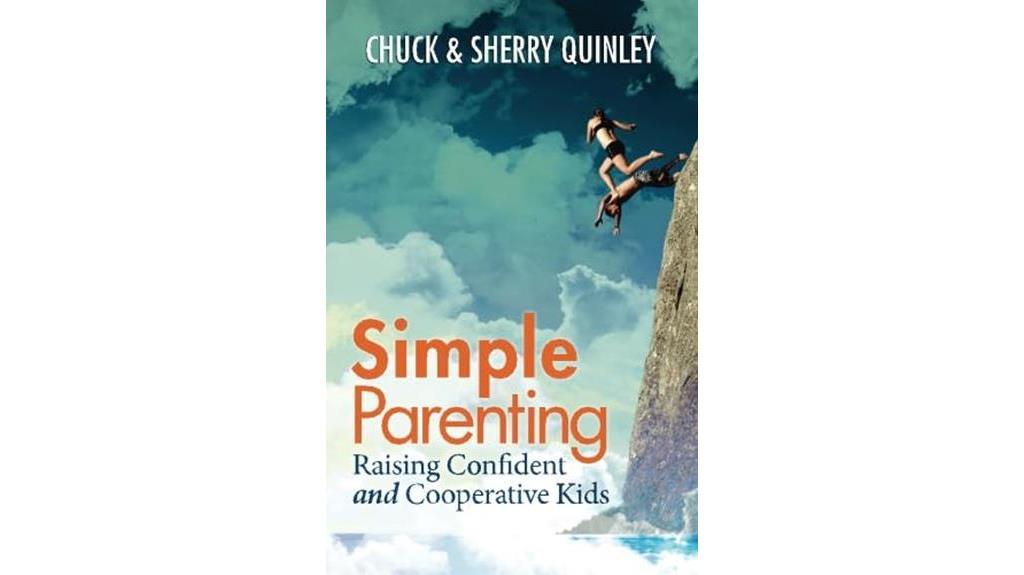
Parents seeking effective and practical strategies for raising confident and cooperative children would benefit greatly from the insights offered in 'Simple Parenting: Raising Confident and Cooperative Kids' within the Waldorf Parenting Books collection.
The Quinleys' parenting method stands out for its wisdom, emphasizing a Control/Teach paradigm that has proven effective in nurturing children's confidence and cooperation. Readers have praised the practical takeaways from the book, with many recommending it to new parents and others looking to enhance their parenting skills.
The birthday tradition shared in the book, seen as a blessing, highlights the Quinleys' unique approach to building a strong foundation for a bright future through everyday parenting efforts. Personal experiences attest to the success of the Quinleys' parenting style, with admiration for their confident children and appreciation for the love and guidance that shaped them.
The positive testimonials and impactful strategies make 'Simple Parenting' a valuable resource for parents looking to raise self-assured and collaborative kids.
Best For: Parents seeking practical and impactful strategies to raise confident and cooperative children through wisdom and control/teach paradigm parenting.
Pros:
- Insightful parenting method emphasizing confidence and cooperation
- Practical takeaways and foundational aspects for enhancing parenting skills
- Positive testimonials and recommendations from readers and successful individuals
Cons:
- Specific focus on a particular parenting style may not appeal to all parents
- Limited information on alternative parenting approaches
- Potential challenge in implementing all strategies depending on individual family dynamics
Factors to Consider When Choosing Waldorf Parenting Books

When selecting Waldorf parenting books, it's important to take into account factors like the selection criteria, features of the book, relevance of the content, insights on user experience, and practical application. These elements play a significant role in determining the effectiveness and value of the parenting resources.
Selection Criteria
When selecting Waldorf parenting books, it's important to carefully consider the author's background and expertise in Waldorf education. Authors who've direct experience in Waldorf teaching or parenting within a Waldorf community are more likely to provide valuable insights and practical advice that align with the principles of Waldorf education.
Additionally, look for books that resonate with your own parenting philosophy and values, ensuring that the content supports your beliefs and goals in raising your child.
A thorough Waldorf parenting book should cover a wide range of topics, from understanding child development through the lens of Waldorf principles to offering practical tips for everyday parenting challenges. It's beneficial to choose books that strike a balance between theoretical discussions on Waldorf education and actionable guidance for implementing these principles in real-life situations.
Seeking recommendations from Waldorf educators, fellow parents in Waldorf communities, or trusted sources can also help in identifying high-quality parenting books that meet your needs and expectations.
Parenting Book Features
Considering the features of parenting books is crucial when selecting Waldorf parenting books that align with our parenting philosophy and goals.
It's important to look for books that focus on practical parenting strategies, such as effective communication techniques and positive discipline methods. These books should also offer insights into child development, guiding parents on how to support their children's growth at various stages.
A good Waldorf parenting book should strike a balance between the philosophical foundations of Waldorf education and hands-on activities that parents and children can enjoy together.
Additionally, it's beneficial to choose books that address specific parenting challenges like fostering independence, creating a nurturing home environment, and strengthening parent-child relationships.
Prioritizing books that combine personal experiences, expert advice, and practical tips for implementing Waldorf principles in daily parenting practices can provide a well-rounded resource for parents seeking guidance in their Waldorf-inspired parenting journey.
Content Relevance
To select appropriate Waldorf parenting books, we must evaluate how well the content aligns with our parenting philosophy and goals.
It's essential to contemplate whether the book addresses specific challenges or stages you're facing in your parenting journey.
Look for books that resonate with your family's values and beliefs, as this alignment can make the advice more relevant and practical for your situation.
Practical advice and actionable strategies are vital aspects to ponder when choosing a Waldorf parenting book.
Make sure that the book provides insights and guidance that are relevant to raising children in today's world, considering the unique challenges and opportunities present in modern society.
User Experience Insights
Exploring user experience insights is essential in evaluating the practicality and impact of Waldorf parenting books for potential readers seeking guidance in their parenting journey. By delving into users' personal encounters with these books, one can gauge how well the content resonates with parents and caregivers.
This firsthand feedback sheds light on the effectiveness of the parenting strategies and advice offered within the pages. User experiences often highlight a book's ability to address common parenting challenges and provide tangible solutions, giving prospective readers a glimpse into what they can expect.
Understanding these insights can be instrumental in selecting Waldorf parenting books that align with one's parenting philosophy and goals. By considering the practical experiences shared by others, individuals can make informed decisions on which resources may best support them on their parenting path.
Practical Application
When selecting Waldorf parenting books, it's important to assess the practicality of the presented parenting strategies for our daily family life. Look for books that offer actionable steps and real-life examples to apply the principles effectively.
It's beneficial to evaluate if the book provides hands-on activities or exercises that you can implement with your children. Check if the book includes age-appropriate information and tips for different stages of child development.
Choosing books that offer practical solutions to common parenting challenges you may face in your Waldorf-inspired journey can be advantageous. By considering these factors, we can guarantee that the parenting strategies and techniques suggested in the book align well with our family's lifestyle and needs.
Practical application is key in implementing Waldorf principles effectively within our daily routines, and selecting books that cater to this aspect can greatly enhance our parenting journey.
Frequently Asked Questions
What Are the Key Principles of Waldorf Parenting?
Waldorf parenting emphasizes a holistic approach to child development, focusing on nurturing a child's physical, emotional, and intellectual growth.
Key principles include fostering creativity through imaginative play, limiting exposure to technology, promoting a rhythmical daily routine, and encouraging hands-on learning experiences.
How Can I Incorporate Waldorf Teachings Into Everyday Life?
Incorporating Waldorf teachings into everyday life involves prioritizing simplicity, creativity, and connection.
We focus on fostering a rhythm that aligns with nature's seasons, engaging in hands-on activities like crafting and gardening, and limiting exposure to technology.
Meal times become moments to bond and appreciate wholesome food.
Outdoor play and exploration are encouraged to cultivate a deep connection with the natural world.
These practices enrich our daily lives and support our children's holistic development.
Are There Specific Strategies for Dealing With Challenging Behaviors?
When dealing with challenging behaviors, it's important to first understand the root cause. By observing patterns and triggers, we can tailor our responses accordingly.
Consistent discipline with clear boundaries is vital, along with positive reinforcement for desired behaviors.
Communication is essential; listening actively and expressing emotions constructively fosters mutual understanding.
Patience and empathy go a long way in addressing challenging behaviors effectively, creating a supportive environment for growth and learning.
Can Waldorf Parenting Books Help With Sibling Relationships?
Yes, Waldorf parenting books can offer valuable insights and strategies for enhancing sibling relationships. These resources often emphasize fostering empathy, communication skills, and conflict resolution techniques among siblings.
How Can I Support My Child's Natural Development Through Waldorf Education at Home?
To support our child's natural development through Waldorf education at home, we prioritize creating a nurturing environment that values creativity, imagination, and hands-on learning.
We engage in simple, rhythmic daily routines, incorporate natural materials into playtime, encourage outdoor exploration, and limit exposure to screens.
Are Waldorf Parenting Books Also Suitable for Parents of 8-12 Year Olds?
Looking for the best parenting books for 8-12 year olds? Waldorf parenting books can offer valuable insights for parents of children in this age group. While they may not be specifically tailored to older kids, the principles and techniques can still be applied to effectively guide and support parents of 8-12 year olds.
Conclusion
To wrap up, these 14 Waldorf parenting books offer valuable insights and practical tips for raising calmer, happier, and more secure children. By incorporating the principles of simplicity, creativity, and connection, parents can create a nurturing environment that supports their child's natural development.
With these resources, families can begin a journey of mindful parenting that fosters cooperation, confidence, and joy in the home. Explore these books and discover the potential of Waldorf education in your parenting journey.
Vetted
15 Best Natural Parenting Books Every Parent Should Read
Yearning for insightful guidance on natural parenting? Discover the top 15 books every parent should read for holistic approaches and valuable tips.

Navigating natural parenting involves discovering the **best books** on pregnancy, childbirth, and parenting styles. **’The Mama Natural Week-by-Week Guide’** gives amazing advice. **’Raising Good Humans’** offers mindful parenting tips. **’Natural Hospital Birth’** mixes natural and hospital births wonderfully. **’Your Child’s Best Face’** shares solid child health tips. **’The Nourishing Traditions Book’** explores traditional nutrition. **’Smart Medicine for a Healthier Child’** presents holistic remedies. **’Thriving with ADHD’** aids in natural ADHD management. Dive into these top natural parenting books and enjoy the journey!
Key Takeaways
- Practical tips for pregnancy, labor, and postpartum.
- Insightful strategies for handling parenting challenges.
- Empowerment for unmedicated hospital births.
- Solutions for child health and wellness.
- Traditional nutrition wisdom for holistic child-rearing.
The Mama Natural Week-by-Week Guide to Pregnancy and Childbirth

For those seeking a thorough and natural approach to pregnancy and childbirth, 'The Mama Natural Week-by-Week Guide' is an invaluable resource.
This detailed book breaks down essential information into easily digestible sections, covering everything from appointments and tests to exercises and healthy practices during pregnancy.
I appreciate the science-based research woven throughout the book, along with its beautiful illustrations that enhance understanding.
The week-by-week guide offers a unique perspective on pregnancy from a natural angle, making it a standout choice for expectant mothers.
Readers have shared positive experiences with the book, highlighting its practical tips, illustrations, and guidance on various aspects of pregnancy, labor, postpartum, and even pregnancy loss.
Whether you're a first-time mom or already experienced, this book emphasizes the importance of informed decision-making throughout your pregnancy journey.
Best For: Expectant mothers seeking a comprehensive and natural approach to pregnancy and childbirth.
Pros:
- Provides easily digestible information on various pregnancy-related topics.
- Offers practical tips, beautiful illustrations, and guidance for pregnancy, labor, and postpartum.
- Emphasizes informed decision-making and encourages a natural perspective on pregnancy.
Cons:
- Some readers have reported issues with printing errors and damaged copies.
- Minor concerns about the cost and appearance of the book.
- Quality feedback varies among readers.
Raising Good Humans: A Mindful Guide to Breaking the Cycle of Reactive Parenting
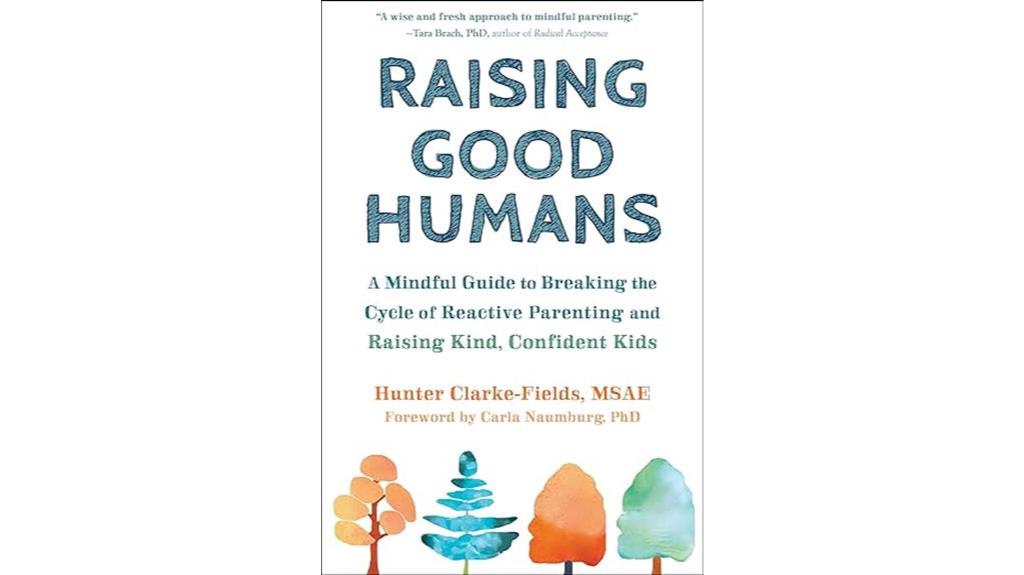
This insightful guide on breaking the cycle of reactive parenting is a valuable resource for parents seeking to enhance their approach to raising children mindfully. With positive reviews highlighting its helpfulness and engaging delivery, 'Raising Good Humans' has resonated with many readers, especially first-time parents.
The book's impact on parenting is evident, with readers mentioning a shift in their parenting style and the ability to navigate challenging moments with their children more effectively. While some readers faced challenges in unlearning past habits, the emphasis on self-work and mindfulness practices proved beneficial in their parenting journey.
Personal experiences shared by readers showcase the book's effectiveness in identifying triggers, promoting self-reflection, and ultimately, helping individuals become better parents. By emphasizing specific techniques like I language and mindfulness practices, this book equips parents with the tools to raise confident and emotionally resilient children.
Best For: Parents looking to break the cycle of reactive parenting and adopt a mindful approach to raising confident and resilient children.
Pros:
- Insightful and engaging delivery that resonates with readers.
- Effective strategies for handling difficult parenting moments.
- Emphasis on self-work and mindfulness practices for personal growth as a parent.
Cons:
- Some readers may find it challenging to unlearn past parenting habits.
- Initial difficulty in approaching mindfulness practices for a few readers.
- The emphasis on self-reflection and personal growth may require significant effort and commitment.
Natural Hospital Birth 2nd Edition: The Best of Both Worlds

With its practical guidance and real-life accounts, 'Natural Hospital Birth 2nd Edition: The Best of Both Worlds' is an invaluable resource for expectant mothers seeking to prepare for unmedicated hospital births.
The book not only offers information on natural birthing techniques but also provides insights into maneuvering the hospital environment while aiming for a medication-free delivery.
Readers appreciate the unbiased approach taken by the author, which allows all birthing mothers to benefit from the book's content, regardless of their birth plan.
By sharing personal experiences and testimonials, the book instills confidence in women, empowering them to advocate for their preferences during childbirth.
'Natural Hospital Birth 2nd Edition' stands out for its practical advice, helping mothers create birth plans aligned with their desires and make informed decisions throughout the labor process.
Best For: Expectant mothers seeking to prepare for unmedicated hospital births and looking for unbiased, practical guidance.
Pros:
- Valuable information for preparing for unmedicated hospital births
- Real-life accounts and personal experiences shared
- Empowers women to make informed decisions and advocate for their preferences during childbirth
Cons:
- May not cater to those planning medicated births
- Limited focus on alternative birthing options outside of hospitals
- Some readers may find the content repetitive if already well-versed in natural birthing techniques
Your Childs Best Face: How To Nurture Top Health & Natural Glow

Exploring your child's top health and natural glow is made accessible through the insightful guidance provided in 'Your Child's Best Face,' a must-read for parents seeking to prioritize their child's overall well-being.
This book investigates the facial signs that can indicate underlying dental and systemic issues in children. It stresses the importance of early interventions to improve health outcomes.
In today's modern lifestyle, factors like diet and breathing habits can impact a child's facial development and overall health. 'Your Child's Best Face' offers practical solutions to reverse issues like mouth breathing and cavities, highlighting the link between facial symmetry and gut health.
With clear visuals and real-life cases, this book equips parents and dentists with the knowledge needed to address early signs of dental problems and promote their child's well-being.
Best For: Parents and dentists who want to understand the early signs of dental and systemic issues in children and learn how to improve their overall health outcomes.
Pros:
- Offers practical solutions to reverse issues like mouth breathing and cavities in children.
- Provides clear visuals and real-life cases to enhance understanding of facial development and health.
- Emphasizes the importance of early interventions for better physical and mental well-being in children.
Cons:
- Might require further professional consultation for specific individual cases.
- Some readers may find the technical dental terminology challenging to grasp.
- Not a quick-fix solution and requires consistent effort and follow-through.
The Nourishing Traditions Book of Baby & Child Care

For parents seeking a holistic approach to child-rearing rooted in traditional nutritional wisdom, 'The Nourishing Traditions Book of Baby & Child Care' offers an all-encompassing guide. This book explores the benefits of a traditional diet rich in grass-fed animal fats and proteins, contrasting it with conventional beliefs.
Drawing inspiration from Dr. Weston Price's research on traditional diets, it critiques mainstream dietary advice for babies and emphasizes the importance of animal fats in promoting healthy childbearing.
From pregnancy and nutrition guidelines to childbirth and newborn care advice, this book covers a wide array of topics. It also provides insights on infant care, feeding, child development, and nutrition, advocating for real foods and offering practical tips on parenting and toxin avoidance.
If you're looking to nurture your child's health through traditional nutritional practices, this book is a valuable resource.
Best For: Parents seeking a holistic and traditional approach to child-rearing through nutrition-focused practices.
Pros:
- Comprehensive coverage of traditional nutritional wisdom for raising healthy children.
- Emphasis on the importance of real foods and nutrients over conventional dietary advice.
- Practical tips and insights on pregnancy, childbirth, infant care, and child development.
Cons:
- May not align with mainstream dietary guidelines, potentially causing conflicting viewpoints.
- Emphasizes animal fats and proteins, which may not suit all dietary preferences.
- Some recommendations, such as homemade baby formulas, may require extra effort and preparation.
Mindful Birthing: Training the Mind, Body, and Heart for Childbirth and Beyond
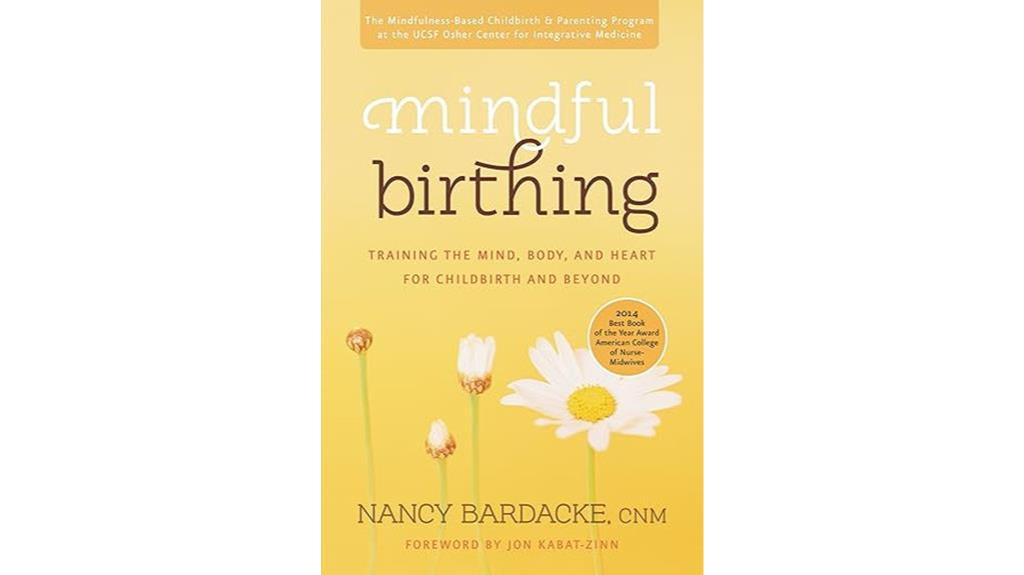
Readers seeking a thorough guide to incorporating mindfulness practices into their childbirth experience and beyond will find 'Mindful Birthing' a valuable resource.
This book has been praised for its ability to ease worries about childbirth and provide practical tools for labor and delivery. Many readers appreciated the holistic approach that 'Mindful Birthing' offers, finding the mindfulness techniques helpful in staying calm and in control during the birth process.
The non-judgmental stance of the book has also been well-received by individuals with different birth experiences. Highly recommended for expecting mothers and their partners, 'Mindful Birthing' has been found beneficial for various types of births, including medication-free births and VBACs.
Additionally, the book includes postpartum mindfulness techniques to help parents stay present and manage stress during the challenging early months of parenthood.
Best For: Expecting mothers and their partners seeking a mindful approach to childbirth and wanting practical tools for labor and delivery.
Pros:
- Provides practical tools for labor and delivery.
- Offers mindfulness techniques to stay calm and in control during childbirth.
- Includes postpartum mindfulness techniques for managing stress in the early months of parenthood.
Cons:
- May not resonate with individuals who prefer traditional childbirth approaches.
- Some readers may find the mindfulness techniques challenging to incorporate into their routine.
- The book's non-judgmental approach may not appeal to those seeking more prescriptive guidance.
The Natural Baby Sleep Solution

In addition to the practical approach offered by 'Natural Parenting Books for Parents' in improving infant sleep patterns through 'The Natural Baby Sleep Solution', this book has garnered positive testimonials. Parents have reported significant improvements in their baby's sleep routines, with some highlighting how the book helped a 10-month-old achieve uninterrupted sleep and reduced night awakenings.
The program's effectiveness was noticeable within just a few days of implementation, indicating quick results for sleep-deprived parents. Additionally, the book provides evidence-based information and valuable insights into recognizing signs of tiredness in babies, aiding in establishing better sleep habits.
While some feedback suggests a lack of tips for older infants, overall, the book's realistic expectations and user-friendly approach make it a valuable resource for parents seeking to enhance their baby's sleep quality.
Best For: Parents seeking evidence-based and practical guidance to improve their baby's sleep patterns efficiently.
Pros:
- Evidence-based information and clear insights for recognizing baby's tiredness cues.
- Quick results observed within a few days of implementing the program.
- Positive testimonials and recommendations from parents highlighting improved sleep quality.
Cons:
- Lack of practical tips specifically tailored for older babies.
- Realistic expectations may not fully address all sleep issues for every infant.
- Could benefit from more comprehensive guidance on sleep training techniques.
Nurture: A Modern Guide to Pregnancy, Birth, Early Motherhood
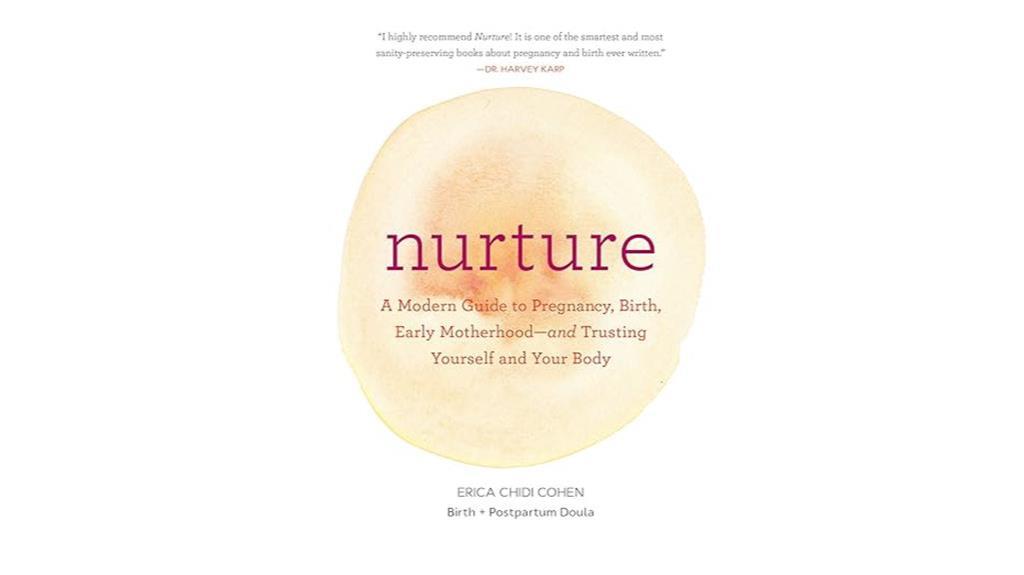
With its focus on holistic and natural birthing practices, 'Nurture: A Modern Guide to Pregnancy, Birth, Early Motherhood' is a valuable resource for expectant mothers seeking empowering and detailed information. The book encompasses various aspects of pregnancy, labor, birth, and postpartum care, offering thorough content ranging from baby development and body changes to breastfeeding and birth plans.
It provides practical advice on holistic birthing practices and includes month-by-month chapters addressing nutrition, exercises, and mental well-being. 'Nurture' also adds a personal touch by guiding readers through the emotional journey of pregnancy, encouraging trust in instincts, and offering relaxation techniques.
Despite some criticisms of basic or outdated information, the book remains educational, informative, and supportive, making it a beneficial read for expecting mothers looking for a blend of science and emotional support.
Best For: Expectant mothers who value holistic and natural birthing practices and seek a comprehensive guide for pregnancy, labor, and early motherhood.
Pros:
- Comprehensive coverage from pregnancy to postpartum, including baby development and birth plans.
- Personalized emotional support and encouragement for trusting instincts.
- Practical advice on holistic birthing practices and month-by-month guidance for well-being.
Cons:
- Some may find the information basic or outdated.
- Not universally applicable due to cultural differences.
- Mixed reviews on the scientific accuracy of the content.
Ina Mays Guide to Childbirth Updated With New Material
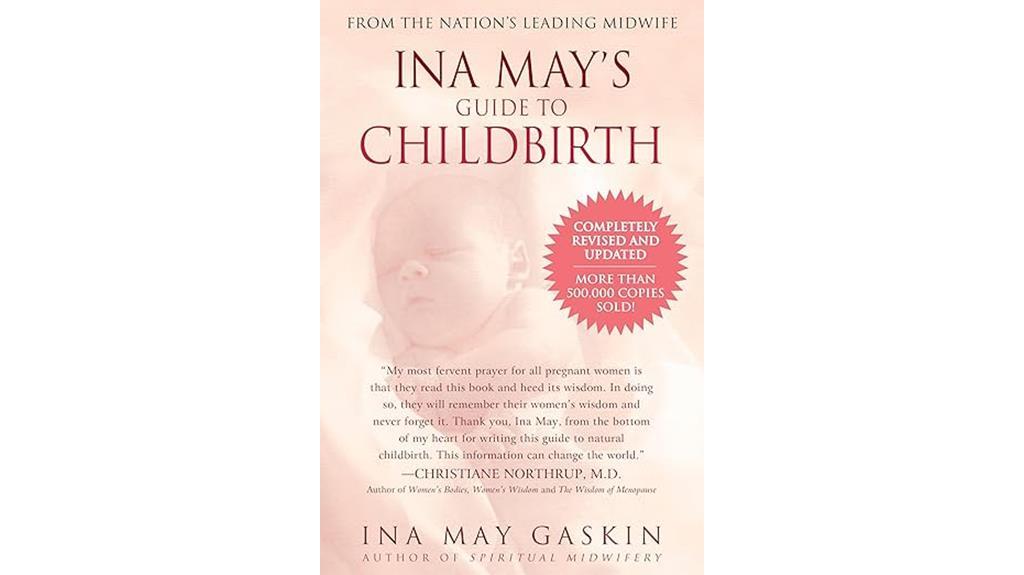
For parents seeking thorough guidance on natural childbirth experiences and empowerment, 'Ina May's Guide to Childbirth' with updated material is an invaluable resource. Ina May Gaskin, a renowned midwife, provides a wealth of knowledge and inspiration in this book.
The updated version includes new material that further enhances its relevance for expecting parents. Through empowering birth stories and practical advice, the book equips readers with confidence and understanding about the childbirth process.
It emphasizes the importance of informed decision-making and advocates for the natural birthing experience while also acknowledging the potential for medical interventions. Whether you're a first-time parent or looking to enhance your childbirth knowledge, 'Ina May's Guide to Childbirth' offers a detailed and insightful perspective that can positively impact your journey into parenthood.
Best For: Expecting parents seeking empowering birth stories, practical advice, and a deeper understanding of natural childbirth.
Pros:
- Provides empowering birth stories and practical advice.
- Equips readers with confidence and understanding about the childbirth process.
- Advocates for informed decision-making and natural birthing experiences.
Cons:
- May not fully address the complexity of medical interventions during childbirth.
- Some readers may find the emphasis on natural birth limiting in certain situations.
- Personal experiences shared may not resonate with all readers.
Breastfeeding Made Simple: Seven Natural Laws for Nursing Mothers

The book 'Breastfeeding Made Simple: Seven Natural Laws for Nursing Mothers' serves as an invaluable resource for first-time breastfeeding mothers looking for practical guidance and support. It offers a thorough guide to help mothers navigate the challenges and joys of breastfeeding.
Through personal experiences shared by other mothers, the book provides reassurance and practical tips on overcoming common breastfeeding obstacles. Reading this book before giving birth can better prepare mothers for the breastfeeding journey ahead.
It emphasizes the benefits of breastfeeding, both considering cost savings and the health advantages it offers to the baby. With explanations on milk supply, latch techniques, and addressing breastfeeding issues, this book equips mothers with the knowledge needed for successful nursing.
Best For: First-time breastfeeding mothers seeking practical guidance and support for overcoming common breastfeeding challenges and achieving successful nursing.
Pros:
- Comprehensive guide offering practical tips and insights from real experiences of other mothers.
- Emphasis on the benefits of breastfeeding and cost savings associated with it.
- Structured content covering essential topics like milk supply, latch techniques, and addressing breastfeeding issues.
Cons:
- May not cater to experienced breastfeeding mothers looking for more advanced techniques or information.
- Some readers may find the content repetitive if they have already gathered similar information from other sources.
- Limited focus on specific medical conditions or complications that may arise during breastfeeding.
The Best Homemade Baby Food on the Planet
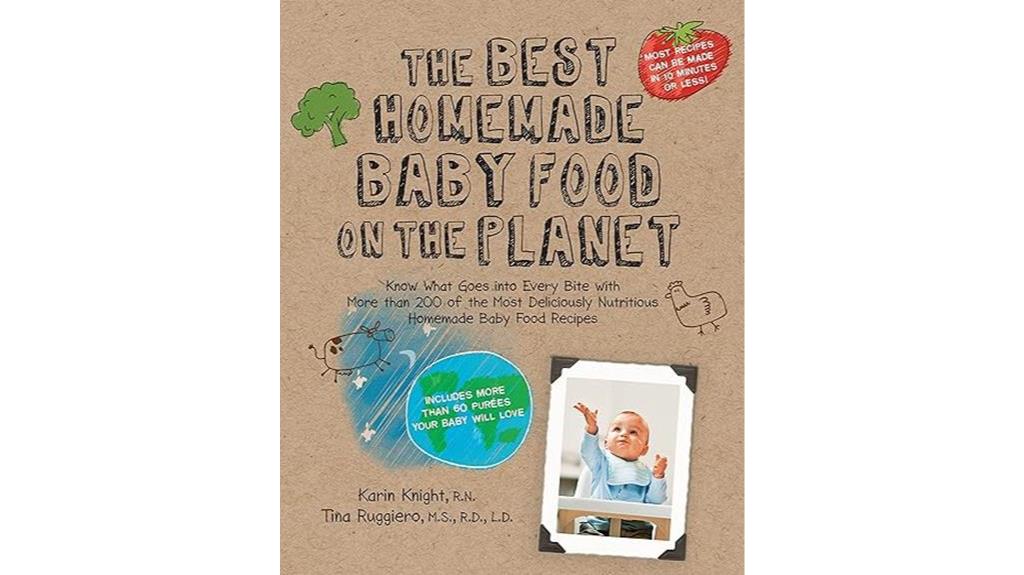
Containing a variety of creative and nutritious recipes, this book is a must-have for parents seeking to provide their babies and toddlers with wholesome homemade meals. With a clear layout and easy-to-follow instructions, it offers a range of healthy options that are quick to prepare, making mealtime a breeze for busy parents.
The incorporation of nutrient-dense foods and age-appropriate recipes guarantees that little ones receive the essential nutrition they need to thrive. Endorsed by a Registered Dietitian, this book emphasizes the significance of good nutrition for young children and provides valuable insights for parents guiding the world of homemade baby food.
From introducing foods based on age to freezer-friendly options and storage tips, this book equips parents with practical information to support their child's healthy eating journey.
Best For: Parents looking for a comprehensive guide to preparing creative and nutritious homemade meals for their babies and toddlers.
Pros:
- Well laid out with clear instructions.
- Variety of creative and healthy recipes.
- Includes practical information and tips for parents.
Cons:
- Some concerns raised about breastfeeding information.
- Desire for more diverse recipes beyond purees.
- Limited ideas catering to older babies.
Gentle Birth, Gentle Mothering: A Doctor's Guide to Natural Childbirth and Gentle Early Parenting Choices
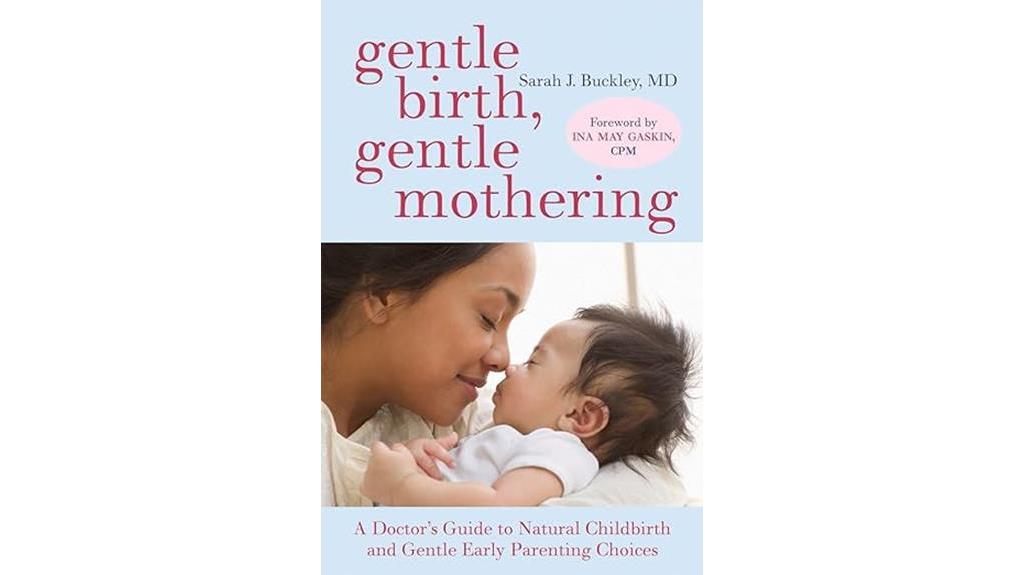
Highly recommended for those seeking evidence-based guidance on natural childbirth and early parenting choices, 'Gentle Birth, Gentle Mothering' empowers individuals to make informed decisions during their pregnancy journey.
Dr. Sarah Buckley's book advocates for undisturbed birth and gentle early parenting choices, presenting research against interventions like ultrasound and epidurals while emphasizing the benefits of skin-to-skin contact and breastfeeding.
The well-rounded mix of scientific facts and personal experiences encourages readers to explore birth options with an open mind. While some critics find the book too focused on natural birth, many appreciate the confidence it instills during labor.
Overall, 'Gentle Birth, Gentle Mothering' offers a thorough look at childbirth choices, helping readers navigate the journey with autonomy and informed decision-making.
Best For: Expectant mothers and individuals seeking evidence-based information and empowerment in natural childbirth and early parenting choices.
Pros:
- Research-based information advocating for undisturbed birth and gentle early parenting choices.
- Emphasis on benefits of skin-to-skin contact, co-sleeping, and breastfeeding supported by scientific evidence.
- Encourages informed decision-making in childbirth with a blend of personal experiences and research.
Cons:
- Some readers may find the book's emphasis on natural birth overwhelming or biased.
- Criticisms include a perceived negativity towards medical interventions rather than a balanced view.
- The book may trigger defensiveness or fear of medical interventions for some readers.
Smart Medicine for a Healthier Child

For parents seeking a thorough guide to childhood health remedies, 'Smart Medicine for a Healthier Child' is an invaluable resource. This book offers detailed information on a wide range of treatments for childhood maladies, providing parents with a thorough, effective, and helpful approach to managing their child's health.
It covers allopathic, herbal, homeopathic, and natural remedies in an easy-to-reference alphabetical layout. With a section dedicated to when to call the doctor, it offers valuable guidance in emergency situations. Users praise its extensive approach, practicality, and usefulness in addressing common and uncommon childhood illnesses.
Recommended by parents, birth assistants, and doulas, this book's versatility in providing nutritional, homeopathic, and herbal suggestions makes it a must-have for all parents looking to empower themselves in their child's health management.
Best For: Parents and caregivers looking for a comprehensive guide to managing their child's health through a variety of treatment options.
Pros:
- Provides detailed information on allopathic, herbal, homeopathic, and natural remedies.
- Alphabetical layout for easy reference.
- Includes guidance on when to seek medical help in emergency situations.
Cons:
- May be overwhelming for some users due to the extensive information provided.
- Could benefit from more specific dosage and administration guidelines.
- Limited focus on preventive measures for maintaining children's health.
Thriving with ADHD: A Guide to Naturally Reducing ADHD Symptoms in Your Child

The guide 'Thriving with ADHD: A Guide to Naturally Reducing ADHD Symptoms in Your Child' is a valuable resource for parents seeking holistic strategies to support their child's well-being. Parents who've used the book found it practical, easy to follow, and filled with actionable steps. It serves as an excellent starting point for implementing natural approaches to address ADHD symptoms in children.
The book's holistic perspective, including advice on dietary and lifestyle changes, has been well-received by testimonials. Professionals, like integrative medicine physicians, have praised the impactful solutions presented in the book, emphasizing the importance of finding lasting remedies for children with challenging behaviors.
Readers appreciate the alternative treatment options beyond medication, finding hope in the possibility of their children thriving through healthy and natural methods. The book offers gratitude and inspiration, making it a recommended read for parents looking to understand and address ADHD symptoms from a holistic viewpoint.
Best For: Parents seeking natural and holistic strategies to help their children manage ADHD symptoms effectively.
Pros:
- Practical, easy-to-understand guide with actionable steps.
- Offers holistic approach including dietary and lifestyle recommendations.
- Provides hope and inspiration for parents looking for alternative treatments beyond medication.
Cons:
- May require significant time and effort to implement dietary and lifestyle changes.
- Individual results may vary in terms of symptom improvement.
- Some readers may prefer more in-depth scientific explanations on the strategies suggested.
The Simplest Pregnancy Book in the World

With its practical and informative approach, 'The Simplest Pregnancy Book in the World' is a must-have for expectant moms seeking a straightforward guide to pregnancy and childbirth. This book has garnered positive reviews for its ability to ease fears and provide answers to common questions expectant mothers may have.
It covers a wide range of topics related to pregnancy and childbirth, helping readers prepare for labor and find suitable resources. The information presented is detailed yet concise, making it easy to traverse and understand.
Whether you're a first-time mom or experienced in parenthood, this book offers honest facts, helpful hacks, and practical tips for each trimester and post-birth care. Written in a simple and accessible manner, 'The Simplest Pregnancy Book in the World' is organized for easy reading, making it a valuable resource for journeying through the experience of pregnancy and parenthood.
Best For: First-time and experienced moms looking for a practical and informative guide to pregnancy and childbirth.
Pros:
- Practical, simple, and informative approach.
- Eases fears and answers common questions for expectant moms.
- Useful information presented in a detailed yet concise manner.
Cons:
- May lack in-depth coverage on certain specific topics.
- Some readers may prefer more visual aids or illustrations.
- Limited focus on postpartum mental health and emotional well-being.
Factors to Consider When Choosing Natural Parenting Books

When selecting natural parenting books, it's crucial to take into account criteria such as the author's credibility, the relevance of the content to your parenting style, and the inclusion of practical tips.
Ensuring the book balances modern practices with natural approaches can provide a well-rounded perspective on parenting techniques.
Criteria for Selecting Books
Consideration of the author's credentials and expertise in natural parenting is essential when selecting books on the subject. Making sure that the author has a solid background in natural parenting practices can help guarantee that the information provided is reliable and trustworthy.
Look for books that not only offer practical tips but also present evidence-based research and actionable advice for implementing natural parenting methods effectively. It's beneficial to choose a book that covers a wide range of topics related to pregnancy, childbirth, breastfeeding, and child development to get a thorough understanding of natural parenting.
Additionally, prioritize books that align with your parenting philosophy and values to ensure that the content resonates with your approach. Selecting a book that provides guidance on incorporating natural remedies, holistic practices, and healthy lifestyle choices for raising children can further support your natural parenting journey.
Author Credibility Importance
To ensure the reliability and trustworthiness of information in natural parenting books, it's essential to carefully assess the credibility of the authors behind the content.
When selecting a natural parenting book, consider authors with backgrounds in fields like pediatrics, child psychology, nutrition, or holistic health. Authors who are experienced practitioners, researchers, or educators in natural parenting can offer valuable insights and evidence-based advice.
Look for authors with a strong reputation in the natural parenting community or those who've published well-regarded works in the field. Checking for endorsements, reviews, or recommendations from reputable sources or experts in natural parenting can help gauge the author's credibility.
Authors with relevant qualifications, experience, and expertise in natural parenting increase the credibility of the content they provide. Additionally, authors who've conducted research, published studies, or have a background in child development are more likely to offer valuable insights in their books.
Consider the author's reputation and track record in the natural parenting space to align their perspectives with your values and beliefs.
Relevance to Parenting Style
Understanding how a natural parenting book resonates with my personal parenting philosophy and values is vital when selecting reading material for guidance and insights. It's essential to assess whether the book aligns with my parenting style, whether it's attachment parenting, gentle parenting, or holistic parenting.
By choosing a book that mirrors my approach, I can better integrate the strategies and techniques suggested within its pages. Additionally, evaluating if the book addresses specific challenges I face in my parenting journey is paramount. It's important to make sure that the book's natural parenting approach is evidence-based and backed by research, providing a solid foundation for its recommendations.
Selecting a book that offers practical advice and strategies that can be easily implemented into my daily routines is advantageous. By focusing on my parenting style, concerns, and interests, I can find a natural parenting book that resonates with me and provides valuable insights tailored to my individual needs.
Inclusion of Practical Tips
How can natural parenting books enrich my journey as a parent by providing practical tips for implementing holistic parenting practices effectively and efficiently?
Natural parenting books offer valuable insights into incorporating holistic parenting methods into daily routines. When choosing a book, look for practical tips on breastfeeding, babywearing, natural remedies, and more. Seek step-by-step guidance on creating natural birth plans, making baby food, and practicing mindfulness techniques.
Opt for books with hands-on activities to help you apply these methods in real-life situations. It's beneficial to have real-life examples and case studies to understand how these practices work in different scenarios. Additionally, books should provide resources and references for further exploration. Practical advice supported by scientific evidence ensures safety and effectiveness.
Choose books with manageable tips that suit your busy lifestyle. By incorporating practical tips from natural parenting books, you can navigate the challenges of holistic parenting with confidence and ease.
Balancing Modern Practices
When selecting natural parenting books, it's important to examine how they strike a balance between modern medical practices and traditional or holistic approaches. Look for books that offer a well-rounded view of modern parenting challenges while advocating for natural solutions.
Consider how the books address the integration of modern technology and natural parenting methods. Evaluate if the books provide evidence-based information on the effectiveness of natural parenting techniques in a modern context. Assess whether the books offer practical tips and strategies for incorporating natural parenting principles into a modern lifestyle.
Also, consider how the book balances modern parenting practices with natural and holistic approaches. Look for information on integrating traditional wisdom with contemporary research and recommendations. Evaluate the book's approach to incorporating modern tools and technologies while staying true to natural parenting principles.
Check if the book addresses the challenges of navigating modern lifestyles while prioritizing natural and sustainable parenting choices. Make sure the book offers practical tips and strategies for implementing natural parenting in a modern world.
Research-Backed Information
To make informed choices when selecting natural parenting books, consider prioritizing those that present research-backed information supported by scientific studies and evidence. Look for books that cite reputable sources and studies to guarantee the information provided is reliable and accurate.
It's crucial to choose books that offer a balanced view of natural parenting methods, incorporating both traditional wisdom and modern research findings. Books that emphasize evidence-based practices and recommendations for raising children in a healthy and holistic manner can provide valuable insights.
Additionally, seek out books that emphasize the importance of informed decision-making based on scientific evidence when it comes to natural parenting choices. By selecting books that provide evidence-based information supported by scientific research on natural parenting practices, you can equip yourself with the knowledge needed to make informed decisions for your child's well-being.
Prioritizing research-backed information can help you navigate the vast array of natural parenting advice available and choose strategies based on proven research.
User-Friendly Layout
Consider selecting natural parenting books that feature a user-friendly layout, incorporating clear headings, bullet points, and diagrams to enhance comprehension and ease of navigation. A well-organized book can make it easier to find information quickly and follow the content effectively.
Look for books that break down complex concepts into manageable sections, offering a structured and organized reading experience. Check for clear headings and subheadings that guide you through the content seamlessly.
Opt for books with a consistent format, using bullet points, lists, and summaries to aid in understanding and retention of information. Additionally, a visually appealing layout with illustrations, charts, and diagrams can enhance your comprehension of challenging topics.
Make sure the book includes a table of contents, index, and glossary for easy access to specific topics and terms. By choosing a natural parenting book with a user-friendly layout, you can enhance your reading experience and benefit from a well-structured resource.
Engaging Visual Elements
Exploring natural parenting books involves seeking out those that incorporate engaging visual elements to enhance understanding and retention of information. Visual aids like illustrations, diagrams, and charts play an important role in simplifying complex concepts, making them more accessible and enjoyable to learn.
For instance, illustrations depicting parenting techniques or exercises can clarify instructions, aiding in easier implementation. Additionally, visual representations of data and statistics help readers grasp key points effectively, enabling them to make informed decisions. Books with visually appealing layouts and designs not only enhance the reading experience but also keep readers engaged throughout the content.
Colorful and well-designed graphics not only make the information more appealing but also aid in retention. By breaking up text-heavy sections and incorporating photographs and infographics, natural parenting books cater to various learning styles, ensuring active engagement with the content. Essentially, engaging visual elements are essential in making natural parenting books informative, interactive, and visually stimulating.
Frequently Asked Questions
Can Natural Parenting Books Help With ADHD Symptoms in Children?
Yes, natural parenting books can provide strategies and insights on supporting children with ADHD symptoms. These books often offer holistic approaches, such as nutrition, mindfulness, and positive discipline techniques, which can complement traditional treatment methods.
Understanding how lifestyle factors can impact ADHD symptoms may help parents better navigate their child's challenges. While not a replacement for professional medical advice, these resources can be valuable tools in managing ADHD in children.
How Can I Choose the Best Natural Parenting Book for My Family?
To choose the best natural parenting book for my family, I consider our specific needs and values. Researching authors and their expertise in natural parenting is essential. Reading reviews from other parents can provide valuable insights.
I also look for books that align with my parenting style and goals. Checking for up-to-date information and practical advice guarantees relevance.
Ultimately, selecting a book that resonates with me personally is key to finding the best fit for my family.
What Are Some Key Factors to Consider When Selecting a Natural Parenting Book?
When choosing a natural parenting book, consider the author's credentials, ensuring they have expertise in child development.
Look for a book that aligns with your parenting philosophy and addresses your specific concerns.
Check reviews for insights on readability and practicality.
Assess the book's organization and layout to see if it suits your learning style.
Lastly, opt for updated editions to access the latest research and recommendations.
These factors can guide you to the right natural parenting book for your family.
Do These Books Address Common Breastfeeding Challenges for New Mothers?
When it comes to addressing common breastfeeding challenges for new mothers, natural parenting books often provide valuable insights and practical tips.
These books typically cover topics such as latching issues, low milk supply, engorgement, and mastitis. They offer guidance on proper breastfeeding techniques, troubleshooting problems, and seeking professional support when needed.
Are There Specific Tips for Promoting Natural Sleep Solutions for Babies?
When it comes to promoting natural sleep solutions for babies, establishing a consistent bedtime routine can work wonders.
Incorporating soothing activities like gentle massages or lullabies can signal to your little one that it's time to wind down.
Additionally, creating a calm sleep environment with minimal distractions can help encourage peaceful slumber.
Are Natural Parenting Techniques Suitable for Raising Tweens?
Many parents find it challenging to navigate the tween years. Fortunately, there are numerous best parenting books for tweens that offer valuable insights into natural parenting techniques. By incorporating gentle discipline and open communication, parents can create a supportive and nurturing environment for their tweens to thrive.
Conclusion
As you explore the world of natural parenting, let these books be your guiding light, illuminating the path with wisdom and knowledge.
With each exploration of the page, you'll find yourself empowered to nurture your child with love and intention, creating a bond that will last a lifetime.
So immerse yourself in these insightful reads, and watch as your journey as a parent blossoms into something truly beautiful and fulfilling.
Vetted
15 Best Mindful Parenting Books Every Parent Should Read
Kickstart your mindful parenting journey with these 15 essential books, offering insights and strategies to navigate the challenges of raising children with mindfulness.

**Exploring** mindful parenting books really **boosts** your parenting journey. Must-reads include **”Raising Good Humans”**, which helps you ditch reactive habits, **”Mindful Birthing”**, offering a whole mind-body birth method, and **”Being at Your Best When Your Kids Are at Their Worst”**, packed with practical compassion tips. **”Parenting at Your Best”** shares amazing insights. When choosing from the many options, consider content and how engaging they are. These books give priceless strategies to grow a mindful parenting style.
Key Takeaways
- "Raising Good Humans" offers practical advice for mindful parenting.
- "Mindful Discipline" emphasizes emotional intelligence in parenting.
- "Mindful Birthing" focuses on training the mind, body, and heart.
- "Growing Up Mindful" provides insights on raising mindful children.
- "Parenting from the Inside Out" explores self-understanding in raising thriving kids.
Raising Good Humans: A Mindful Guide to Breaking the Cycle of Reactive Parenting
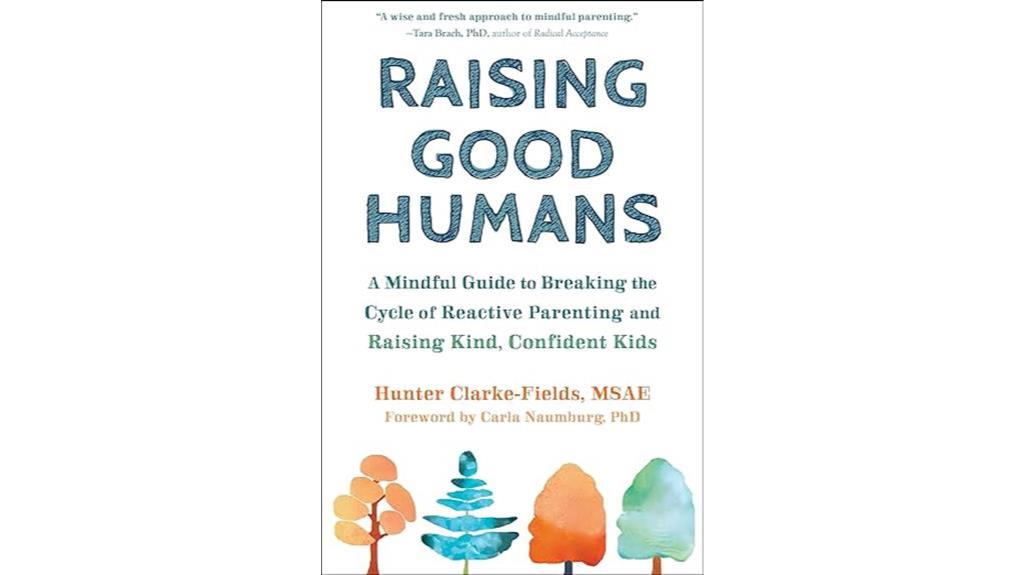
For those seeking insightful guidance on breaking the cycle of reactive parenting and fostering mindful relationships with their children, 'Raising Good Humans' is an invaluable resource. This book has received positive reviews and recommendations for its engaging and helpful approach, making it a must-read for all parents, especially first-timers.
Readers highlight the importance of self-work and patience in parenting, showing how this book can positively impact one's parenting style. Many readers mention how the strategies provided in 'Raising Good Humans' have helped them navigate challenging moments with their children, ultimately leading to more confident kids.
Despite some challenges in unlearning past parenting habits, the emphasis on self-work and mindfulness practices in this book has proven to be transformative for many.
Best For: Parents looking to break the cycle of reactive parenting and develop mindful relationships with their children.
Pros:
- Insightful guidance for improving parenting skills.
- Valuable strategies for handling difficult moments with children.
- Emphasis on self-work and mindfulness practices for personal growth.
Cons:
- Some readers may find it challenging to unlearn past parenting habits.
- Initial difficulty in approaching mindfulness practices for a few readers.
- Requires consistent effort and self-reflection, which may be demanding for some.
Mindful Parenting for ADHD Guide
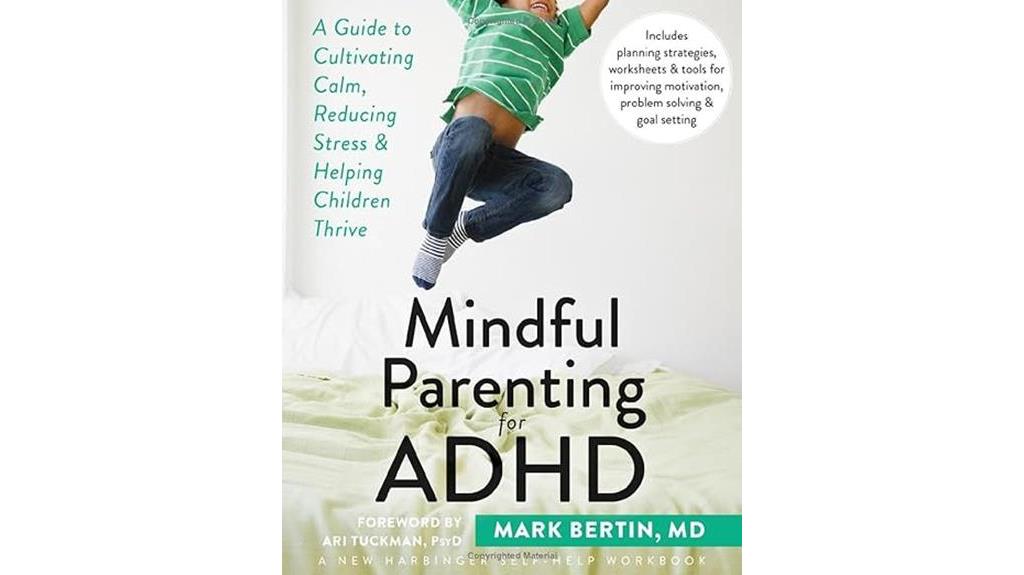
The 'Mindful Parenting for ADHD' guide is an invaluable resource recommended for parents managing the challenges of raising children with ADHD. This book offers a unique and practical approach, providing insightful advice alongside worksheets and action plans.
It covers essential topics such as organization techniques, homework plans, and academic support, emphasizing the importance of aiding children with ADHD in their learning journey. Medical professionals regard it as groundbreaking, contributing to a better understanding of ADHD as a developmental brain delay.
The book also focuses on practical guidance, offering easy-to-follow suggestions for effective parenting skills and communication strategies. By integrating mindfulness practices, it helps parents become more mindful individuals, fostering calm, improved focus, self-regulation, and compassion in handling the complexities of raising children with ADHD.
Best For: Parents of children with ADHD seeking practical guidance and support in mindful parenting techniques.
Pros:
- Comprehensive advice and worksheets for organization and academic support.
- Integration of mindfulness practices for improved focus and compassion.
- Easy-to-follow suggestions for effective parenting skills and communication strategies.
Cons:
- May require consistent practice and dedication to see significant results.
- Not all strategies may work for every child with ADHD.
- Additional support or resources may be needed for more complex cases.
Mindful Birthing: Training the Mind, Body, and Heart for Childbirth and Beyond
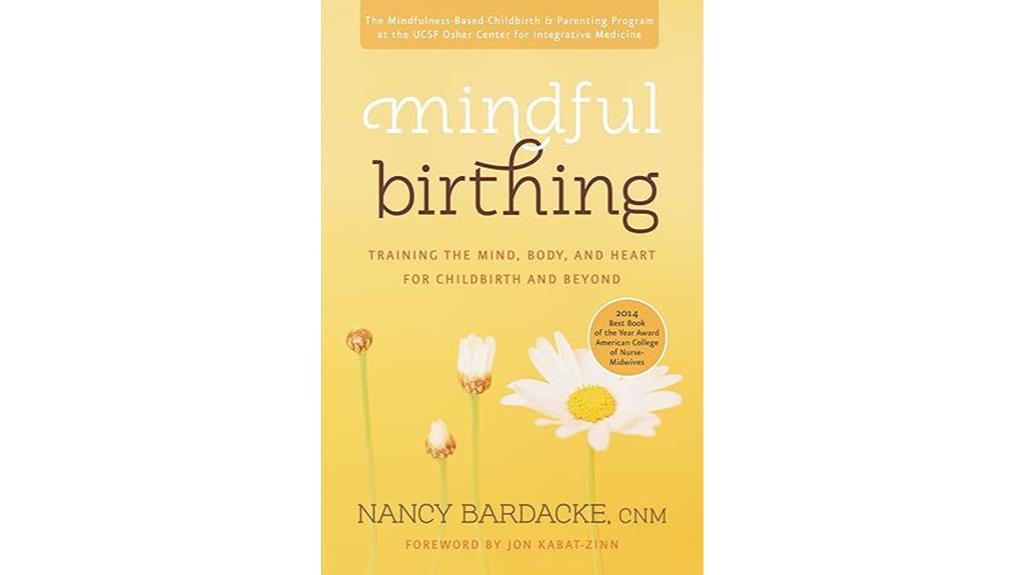
Ideal for expecting parents seeking a holistic approach to childbirth and mindfulness techniques, 'Mindful Birthing' provides valuable tools for managing the birthing experience and beyond. This book has been praised for easing worries surrounding childbirth and offering practical strategies for labor and delivery.
Readers appreciated the non-judgmental approach and found the mindfulness techniques instrumental in staying calm and composed during birth. 'Mindful Birthing' comes highly recommended for expecting mothers and their partners, with many highlighting its effectiveness for various types of births, including medication-free deliveries and VBACs.
Additionally, the book includes guidance on postpartum mindfulness, aiding readers in staying present and managing stress during the initial months of parenting. With positive feedback on its impact on birth experiences, 'Mindful Birthing' is a valuable resource for those seeking a mindful approach to childbirth and beyond.
Best For: Expecting parents looking for a comprehensive guide to mindfulness techniques and holistic approaches to childbirth and parenting.
Pros:
- Offers practical tools and strategies for managing the birthing experience.
- Non-judgmental approach appreciated by readers with different birth experiences.
- Includes guidance on postpartum mindfulness to assist in staying present and reducing stress during early parenting.
Cons:
- Some readers may find the mindfulness techniques challenging to implement consistently.
- May not cater to individuals who prefer a more traditional, medical-focused approach to childbirth.
- Limited focus on specific medical interventions or complications that may arise during childbirth.
Mindful Parenting for ADHD Children
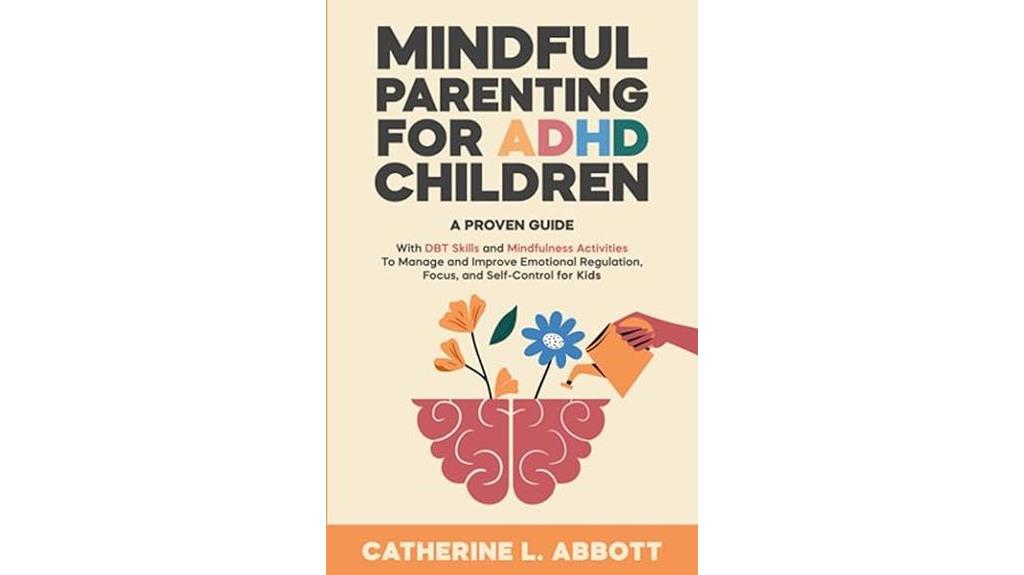
Ideal for parents seeking practical strategies to support children with ADHD, Mindful Parenting Books offer valuable insights and coping mechanisms. These books provide a holistic understanding of ADHD, covering symptoms, causes, and diagnosis. They equip parents with practical tools such as DBT skills and mindfulness activities to help children manage emotional regulation, focus, and self-control effectively.
Readers recommend these books not only for parents but also for foster parents, teachers, and individuals working with children dealing with ADHD. Personal experiences shared by readers highlight how these books have helped them navigate the challenges of raising children with ADHD, offering practical strategies and valuable coping mechanisms.
By promoting self-awareness, self-control, effective communication, and nurturing environments, Mindful Parenting Books play a significant role in fostering harmonious relationships between parents and children with ADHD.
Best For: Parents, foster parents, teachers, and individuals working with children with ADHD seeking practical tools and insights to support emotional regulation and self-control.
Pros:
- Comprehensive understanding of ADHD, including symptoms, causes, and diagnosis.
- Practical tools like DBT skills and mindfulness activities for managing emotional regulation and focus in children with ADHD.
- Empowers parents to create a nurturing environment fostering self-awareness and self-control in children with ADHD.
Cons:
- Subjective nature of content may not resonate with all readers.
- Similar strategies may be available online for free, raising concerns about the book's unique value.
- Some readers may find the content repetitive or lacking in depth in certain areas.
Mindful Parenting Book
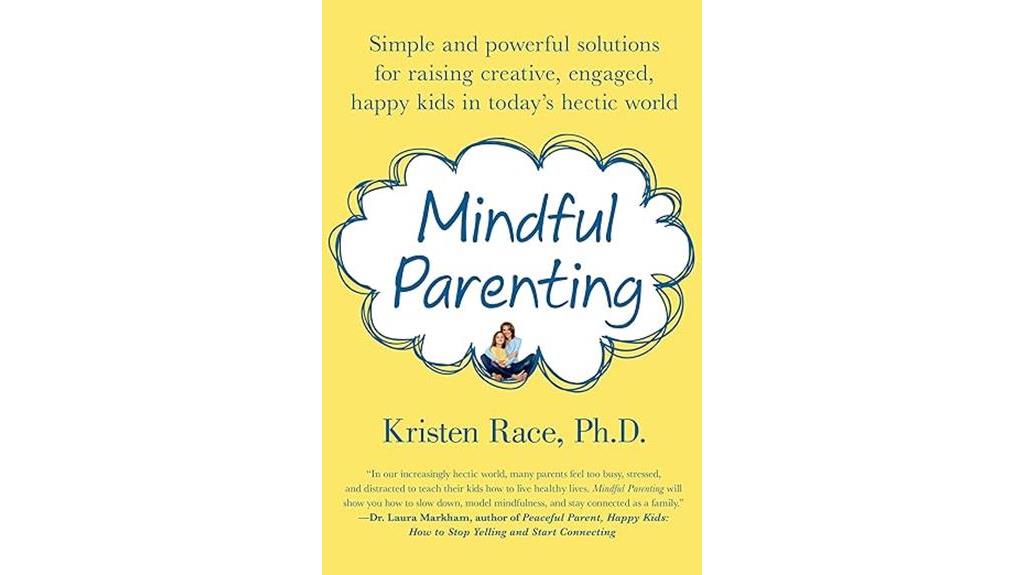
For parents seeking practical and science-backed strategies to explore mindfulness in their parenting approach, this book offers valuable insights and actionable advice. With numerous positive reviews praising its eye-opening content and practicality, this book seems to resonate with a wide range of readers.
It not only delves into understanding why children react the way they do but also provides tips for managing stress and improving mindfulness. Backed by scientific evidence, each chapter offers a blend of research-based information and mindfulness techniques, making it accessible even to those unfamiliar with complex biological concepts.
The book's practical suggestions and easy application have garnered recommendations from various readers, highlighting its global relevance beyond just American audiences. Whether you're a parent, grandparent, or anyone working with children, this book seems to offer a detailed guide to incorporating mindfulness into your parenting journey.
Best For: Parents and caregivers looking for practical, science-backed strategies to integrate mindfulness into their parenting approach.
Pros:
- Offers valuable insights and actionable advice for understanding children's behavior and managing stress.
- Backed by scientific evidence, providing a blend of research-based information and mindfulness techniques.
- Practical suggestions and easy application make it accessible to a wide range of readers, including those unfamiliar with complex biological concepts.
Cons:
- May not delve deep enough into certain advanced parenting topics.
- Could benefit from more diverse perspectives and cultural considerations.
- Some readers may find the content repetitive or overly simplistic.
Mindful Discipline: A Loving Approach to Setting Limits and Raising an Emotionally Intelligent Child
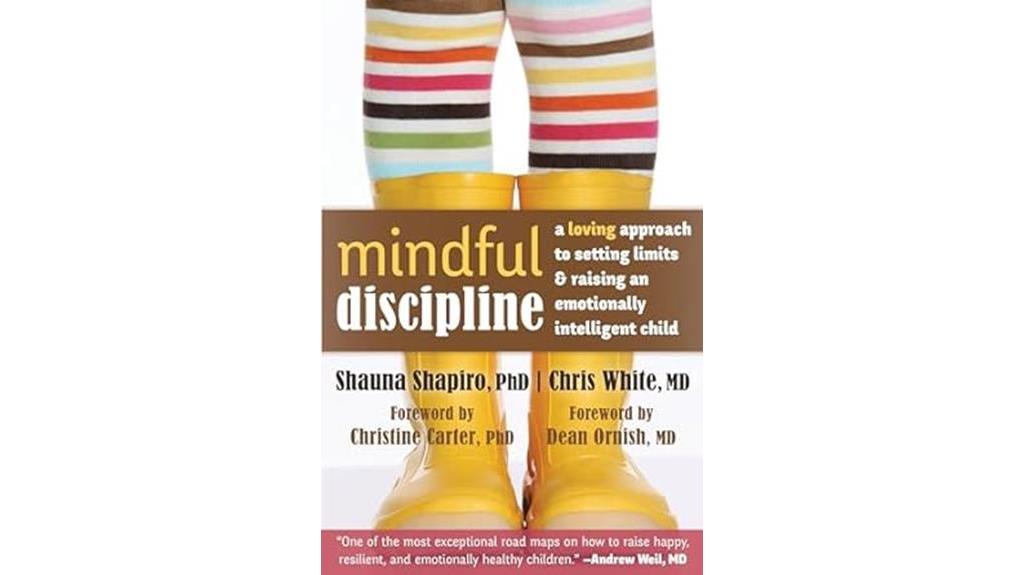
Best suited for parents seeking to incorporate mindfulness and loving discipline in their parenting approach, 'Mindful Discipline: A Loving Approach to Setting Limits and Raising an Emotionally Intelligent Child' offers practical strategies and insights for nurturing emotionally intelligent children. The book is praised for its common-sense approach, providing readers with tangible examples to follow.
By emphasizing mindfulness and balanced discipline, it equips parents with tools to raise children who are emotionally adept. Mindfulness benefits highlighted in the book include improved emotional regulation and resilience for both parents and children.
Readers appreciate the easy-to-implement strategies for setting boundaries and fostering a harmonious home environment. Though some desire more hands-on tips, the academic foundation of the book ensures a well-balanced and science-based approach to mindful parenting.
Best For: Parents looking to incorporate mindfulness and loving discipline in their parenting approach to raise emotionally intelligent children.
Pros:
- Practical strategies and tangible examples provided for nurturing emotionally intelligent children.
- Emphasis on mindfulness and balanced discipline to equip parents with effective tools.
- Easy-to-implement strategies for setting boundaries and fostering a harmonious home environment.
Cons:
- Some readers desire more hands-on tips and examples.
- Need for alternative strategies if initial suggestions do not work smoothly.
- Lack of practical advice and examples may leave some readers feeling the book falls short of expectations.
Parenting from the Inside Out: How a Deeper Self-Understanding Can Help You Raise Children Who Thrive

With its focus on deeper self-understanding to enhance parenting skills, 'Parenting from the Inside Out' is a valuable resource for those seeking to cultivate a strong and nurturing relationship with their children.
This book explores the importance of understanding one's own past and emotions to become a better parent. By investigating how our upbringing influences our parenting style, 'Parenting from the Inside Out' offers a fresh perspective on raising children.
It emphasizes the significance of healing past wounds and developing a deeper self-awareness to create a more empathetic and understanding environment for our children to thrive.
Through personal insights from professionals and scientific references, this book provides practical tools for self-growth and fostering stronger parent-child relationships.
If you're looking to enhance your parenting skills through inner reflection and understanding, 'Parenting from the Inside Out' is a must-read.
Best For: Individuals seeking to improve their parenting skills through deeper self-understanding and healing past wounds.
Pros:
- Offers valuable insights on how personal history influences parenting style.
- Provides practical tools and exercises for self-growth and fostering better parent-child relationships.
- Backed by personal insights from professionals and referenced scientific material for a comprehensive understanding.
Cons:
- May require a significant amount of introspection and emotional work.
- Some readers might find the psychological concepts challenging to grasp initially.
- Not a quick-fix solution and requires ongoing commitment to personal growth and reflection.
Under the Chinaberry Tree: Books and Inspirations for Mindful Parenting

When considering books for mindful parenting, exploring 'Under the Chinaberry Tree' can provide valuable insights and inspirations for traversing the journey of raising young children. This book has garnered positive reviews for its comforting and valuable content, appreciated by fans of Chinaberry's offerings.
Ann's wisdom and humor shine through, making it a recommended read for all parents of young children. Despite some critiques about its focus on specific age groups and design elements, the book's teachings on parenting from the heart and soul have left a lasting impact on readers.
Through personal growth and a unique perspective, 'Under the Chinaberry Tree' has influenced many to become better parents. Sharing personal experiences and recommendations, this book serves as a guiding light for mindful parenting.
Best For: Parents seeking valuable insights and inspirations for mindful parenting to navigate the journey of raising young children.
Pros:
- Offers comforting and valuable content appreciated by fans of Chinaberry's offerings.
- Provides teachings on parenting from the heart and soul, impacting personal growth and perspective.
- Recommended read for all parents of young children, influencing better parenting skills.
Cons:
- Critiques regarding the focus on specific age groups in the book.
- Some children may not find recommended books appealing.
- Design elements such as detailed illustrations and the green typeface may impact engagement and readability.
Growing Up Mindful
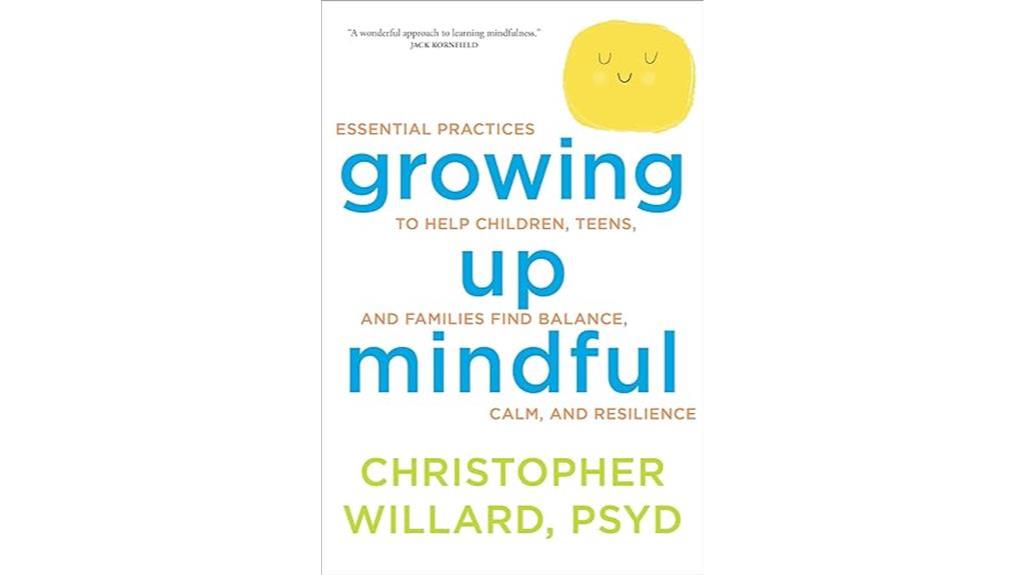
For parents, teachers, therapists, caregivers, or anyone interested in sharing mindfulness with children, 'Growing Up Mindful' offers easily implemented practices and a positive outlook on teaching mindfulness to kids. This book provides a variety of practical suggestions that are clear, easy to follow, and suitable for individuals at all experience levels.
It includes a helpful chart showcasing the positive impact of regular mindfulness practice, making it a valuable resource for those looking to introduce mindfulness into children's lives. With a writing style that's genuine and easy to understand, 'Growing Up Mindful' incorporates mindful interludes for experiential learning, enhancing the overall reading experience.
Users have praised this book as one of the best resources for teaching mindfulness to children, making it a must-have for anyone interested in incorporating mindfulness practices into their families or classrooms.
Best For: Parents, educators, therapists, and caregivers seeking a comprehensive and user-friendly guide for teaching mindfulness to children.
Pros:
- Easily implemented practices suitable for beginners and experienced individuals.
- Genuine writing style with mindful interludes for experiential learning.
- Positive impact chart showcasing the benefits of regular mindfulness practice.
Cons:
- Some users reported receiving books with stains upon arrival.
- One user recommended purchasing the physical copy over the digital version.
- Limited mention of potential challenges or obstacles in implementing mindfulness practices with children.
Practicing Mindfulness: 75 Essential Meditations to Reduce Stress, Improve Mental Health, and Find Peace
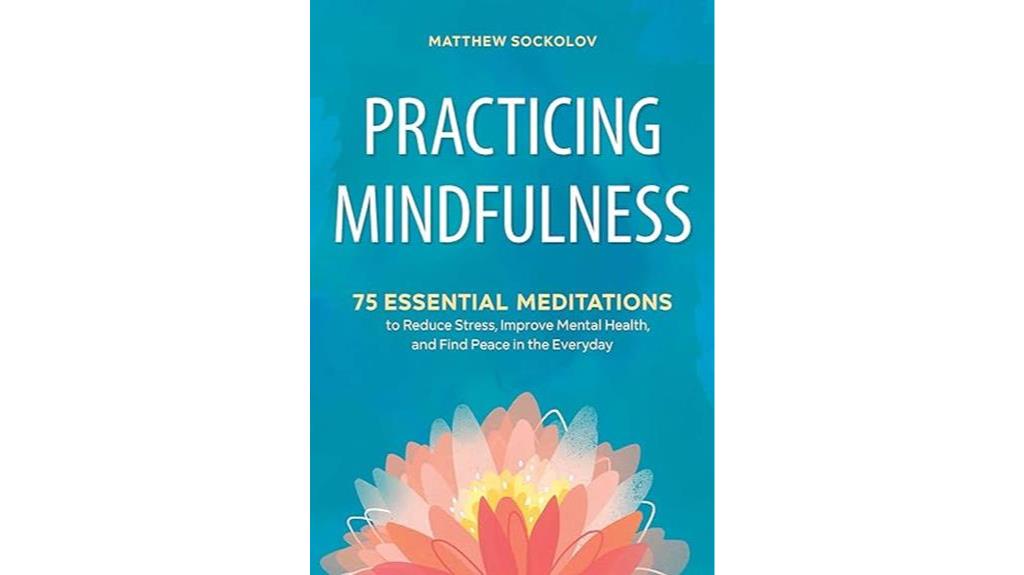
Ideal for busy parents seeking quick and effective mindfulness practices, 'Practicing Mindfulness: 75 Essential Meditations to Reduce Stress, Improve Mental Health, and Find Peace' offers accessible techniques tailored for daily use. This book by Mathew Sockolov presents a wide range of meditation approaches designed to fit into even the busiest schedules, with sessions lasting between 5 to 20 minutes.
It covers areas such as basic mindfulness exercises, everyday mindfulness, and mindful moods, making it a thorough guide for self-improvement through meditation. Readers have praised its simplicity, readability, and practicality in incorporating meditation into their daily routines.
Whether you're new to mindfulness or a seasoned practitioner, this book provides valuable resources for managing emotions and stress effectively in everyday life.
Best For: Individuals with busy schedules seeking accessible and effective mindfulness practices.
Pros:
- Offers a wide range of meditation approaches suitable for daily use.
- Simple and practical exercises that take little time to complete.
- Comprehensive guide covering various areas for self-improvement through meditation.
Cons:
- Some may find the meditation ideas presented overly simplistic.
- Content may not be deemed substantial enough for certain preferences.
- A perception of the material being more suitable for a blog post or series rather than a book.
The Book of Joy: Lasting Happiness in a Changing World

Exploring 'The Book of Joy: Lasting Happiness in a Changing World' offers valuable insights for parents seeking to cultivate compassion and empathy in their parenting journey. Published in 2016, this book documents a remarkable week-long meeting between the Dalai Lama and Archbishop Desmond Tutu, focusing on the pursuit of joy amidst life's challenges.
Divided into three parts, it covers the essence of true joy, the barriers to joy, and the pillars of joy. Delving into topics like suffering, forgiveness, and compassion, the book provides practical advice on finding happiness and maintaining mental well-being.
Readers appreciate the wisdom, humor, and depth of humanity portrayed in this book, making it a recommended read for those looking to enhance their personal growth and embrace joy in an ever-changing world.
Best For: Parents seeking to instill compassion and empathy in their parenting journey through profound insights on joy and resilience.
Pros:
- Offers practical advice on finding happiness and maintaining mental well-being.
- Delightful blend of wisdom, humor, and humanity.
- Insightful exploration of joy amidst life's challenges.
Cons:
- May require reflection and introspection, which can be time-consuming.
- Some readers may find the content emotionally intense.
- Not a quick-fix solution for immediate happiness.
Beginners Guide on Parenting Children with ADHD: Modern Approach to Understanding and Leading Hyperactive Child to Success

When seeking a practical and insightful guide on parenting children with ADHD, 'Mindful Parenting Books' stands out as a valuable resource. This book has garnered positive reviews for its helpful content and modern approach to dealing with ADHD.
While it may lack concrete suggestions on how to help kids with ADHD according to some critics, it's still praised for its clear and concise style, making it great for beginners. Some readers appreciate the perspective offered by the knowledgeable author, although a few feel it could benefit from more practical advice.
Overall, the book emphasizes the importance of wise parenting in guiding ADHD children and incorporates successful therapy methods that have been well-received. Published in 2021, it provides up-to-date information compared to older resources.
Best For: Parents seeking a modern and beginner-friendly approach to understanding and guiding children with ADHD.
Pros:
- Provides valuable content and a modern approach to dealing with ADHD.
- Clear and concise, great for beginners.
- Emphasizes the importance of wise parenting in guiding ADHD children.
Cons:
- Lacks concrete suggestions on how to help kids with ADHD.
- Some find it upsetting to refer to ADHD as an illness.
- Needs more practical advice on what to do instead of what not to do.
Being at Your Best When Your Kids Are at Their Worst: Practical Compassion in Parenting
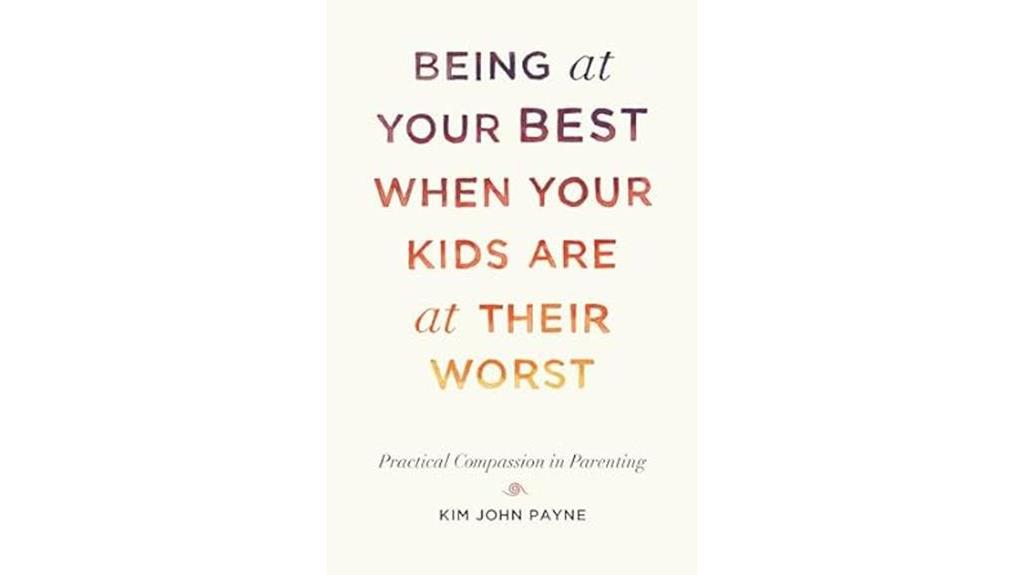
For parents seeking practical guidance on maintaining composure and showing compassion during challenging parenting moments, 'Being at Your Best When Your Kids Are at Their Worst: Practical Compassion in Parenting' stands out as a valuable resource. This book has garnered positive reviews and recommendations for its practical advice and approachable writing style. Readers appreciate the concise and helpful nature of the content, along with the author's use of personal experiences in education.
Despite these strengths, some concerns have been raised regarding the book's applicability to children with attachment issues like Reactive Attachment Disorder. Additionally, a few readers feel that the parenting approaches presented may oversimplify complex behavioral challenges.
However, the book's focus on compassion and empowering parenting techniques remains a highlight, with many sharing how it has helped improve their relationships with their children and reduce conflicts within the family.
Best For: Parents looking for practical and compassionate parenting guidance during challenging moments with their children.
Pros:
- Practical advice and approachable writing style.
- Concise and helpful content with practical tools for parenting.
- Focus on compassion and empowering parenting techniques.
Cons:
- Lack of accommodation for children with attachment issues like Reactive Attachment Disorder.
- Oversimplification of parenting approaches may not suit children with deep behavioral challenges.
- Heavy use of metaphors and catchphrases in the book.
Parenting at Your Best: Powerful Reflections and Straightforward Tips for Becoming a Mindful Parent
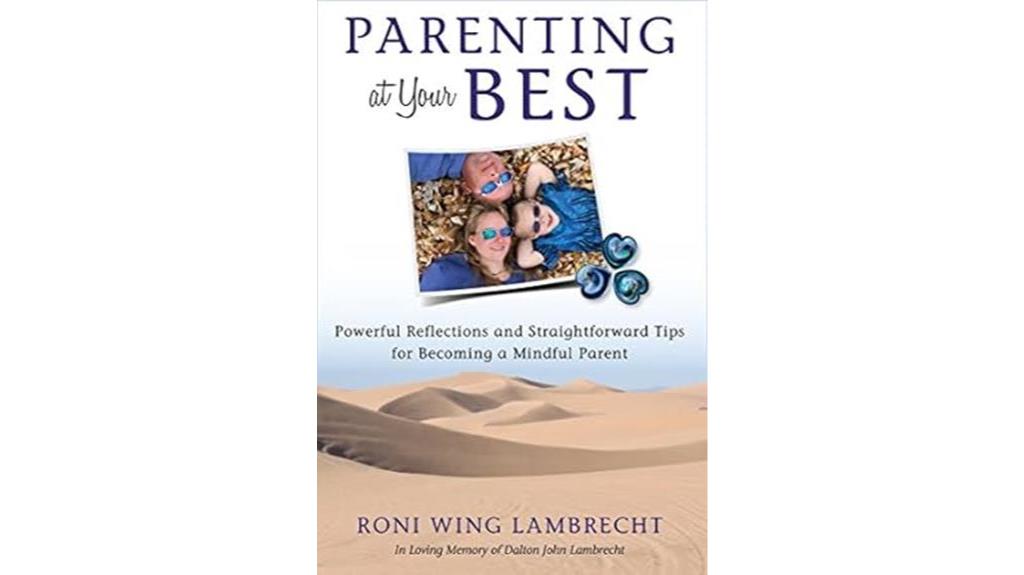
This book, Parenting at Your Best, is a valuable resource for new and soon-to-be parents as well as those who've experienced loss, offering powerful reflections and practical tips for mindful parenting.
Written by Roni Wing Lambrecht, the book draws from the author's personal journey through grief after losing her teenage son, Dalton. It emphasizes the importance of intentional parenting and treasuring moments with our children.
The book focuses on making each parenting moment meaningful, highlighting the significance of respect in parent-child relationships. It provides straightforward and down-to-earth advice, promoting inclusivity and open communication within families.
Readers have found the book to evoke a range of emotions, from smiles to tears, while offering practical and heartfelt guidance for reflecting on parenting approaches.
Overall, Parenting at Your Best is praised for its sincerity, practicality, and ability to resonate with parents looking to enhance their parenting skills.
Best For: Parents looking to enhance their parenting skills and embrace mindful parenting practices.
Pros:
- Offers powerful reflections and practical tips for mindful parenting.
- Written by an author who shares personal experiences and wisdom.
- Emphasizes the value of respect in parent-child relationships.
Cons:
- May evoke strong emotional responses in readers, including tears.
- Focuses on grief and loss, which may be challenging for some readers.
- Some readers may find the approach too sentimental or emotional.
The Mindful Parent
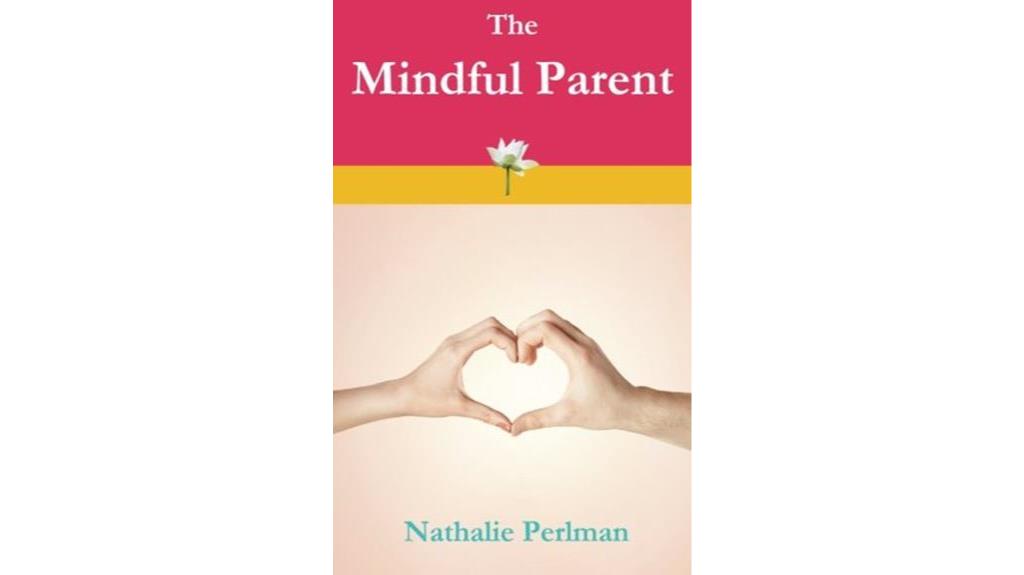
Exploring 'The Mindful Parent' offers valuable insights and practical strategies for parents seeking to cultivate stronger parent-child relationships through mindfulness. This book emphasizes the importance of shifting one's mindset to enhance the dynamics with their children.
It provides actionable tips on incorporating mindfulness into parenting practices to foster better connections and personal development. Despite a few typographical errors, readers have generally appreciated the informative and concise nature of the book.
Readers commend it as essential reading for all parents, praising its ability to offer guidance and help them embrace their parental responsibilities. While some readers have noted the need for better editing and felt the book leaned too heavily on promoting mindful parenting, overall, it's recommended for those looking to enrich their parenting journey with mindfulness principles.
Best For: Parents looking to deepen their bond with their children through mindful practices.
Pros:
- Offers practical tips for applying mindfulness to parenting.
- Emphasizes the importance of changing one's mindset for better parent-child relationships.
- Provides insightful information for personal growth and enhancing parenting skills.
Cons:
- Contains typographical errors that may be distracting.
- Some readers feel it focuses too much on selling the concept of mindful parenting.
- Implementation tips could be more extensive for practical application.
Factors to Consider When Choosing Mindful Parenting Books

When selecting mindful parenting books, it's crucial to take into account key selection criteria such as the author's expertise and the book's reputation.
Assessing the content, reader engagement levels, and practical application tips within the book can help ascertain its usefulness for your parenting journey.
Search for impactful parenting techniques that align with your values and parenting style to make the most of your reading experience.
Key Selection Criteria
Taking into account the author's background and expertise in parenting, mindfulness, or child psychology is vital when selecting mindful parenting books. Authors with experience in these areas are more likely to provide valuable insights and practical advice that can resonate with your parenting journey.
It's essential to look for books that offer practical tips, techniques, and strategies for mindful parenting, as these can be directly applied to your daily interactions with your children. Checking for recommendations or reviews from other parents, educators, or professionals in the field can also give you a better understanding of the book's effectiveness and relevance.
Consider the specific focus of the book, such as ADHD parenting, emotional intelligence, or mindfulness practices, to make sure it aligns with your current needs and challenges. Evaluating the readability and engaging nature of the book is important to make sure that it complements your parenting style and preferences, making the learning process more enjoyable and effective.
Book Content Evaluation
Considering the practicality and relevance of the content is essential when selecting mindful parenting books. It's important to evaluate the depth of insights and wisdom shared by the authors, as well as the presence of personal experiences and relatable anecdotes within the book.
Additionally, looking at how the content aligns with your specific parenting needs and challenges is crucial. Examining the author's background and expertise can provide insight into the basis of their advice, helping you determine the credibility of the information presented.
When evaluating book content, focus on practical tips and strategies offered for implementing mindful parenting, seeking a balance between theory and actionable guidelines. Consider whether the information provided aligns with your parenting goals and values, and if the book addresses common parenting challenges relevant to your family dynamics.
Checking reader feedback can also offer valuable insights into how the book's content has helped others improve their parenting skills and relationships with their children.
Reader Engagement Levels
To choose mindful parenting books effectively, it's important to assess the levels of reader engagement, which play a significant role in the book's impact on implementing mindfulness techniques in parenting.
Engaging content is crucial as it keeps readers interested and motivated to apply the teachings within the book. Interactive elements such as exercises, worksheets, and reflection prompts can enhance engagement by encouraging active participation. Additionally, personal anecdotes and relatable stories can resonate with readers, making the content more relatable and engaging.
Books that offer practical, actionable advice tend to engage readers more effectively in applying mindfulness techniques in parenting situations. Reader engagement levels can be gauged by the emotional responses evoked, such as tears, inspiration, and reflection. Positive feedback from readers praising the book's impact and practical advice is a strong indicator of high engagement levels.
Furthermore, personal experiences shared by readers and recommendations based on practicality and value demonstrate a deep connection and high level of engagement with the book's content.
Practical Application Tips
Practical application tips found in mindful parenting books serve as invaluable resources for parents seeking to implement mindfulness techniques in their day-to-day interactions with their children. These tips offer step-by-step guidance on applying mindfulness practices in various parenting challenges. They provide concrete strategies for enhancing self-awareness, managing emotions, and fostering positive communication with kids. Often, these tips include exercises, reflection prompts, and real-life examples to illustrate effective mindful parenting.
Impactful Parenting Techniques
When choosing mindful parenting books, it's essential to ponder the specific impactful parenting techniques they offer to enhance your relationship with your child.
Effective parenting techniques focus on building strong parent-child relationships and fostering emotional intelligence. Mindful parenting involves practicing self-awareness, empathy, and compassion towards oneself and children.
Techniques such as active listening, setting boundaries with empathy, and modeling positive behaviors are key in mindful parenting. Mindfulness practices like deep breathing, meditation, and self-reflection help parents respond calmly to challenging situations.
These techniques promote emotional regulation, communication skills, and positive behavior modeling for children.
Building strong parent-child relationships based on respect, open communication, and emotional connection is vital.
Being present in the moment, actively listening to your children, setting boundaries with love and consistency, and encouraging self-awareness and emotional regulation are fundamental in mindful parenting.
Positive discipline strategies that prioritize teaching and guiding children are also emphasized.
Frequently Asked Questions
How Can Mindful Parenting Help With Managing ADHD in Children?
Mindful parenting can benefit children with ADHD by fostering increased self-awareness and emotional regulation. By practicing mindfulness techniques, parents can help children manage impulsivity and improve attention span.
Mindful parenting also promotes open communication, patience, and empathy, which are essential in supporting children with ADHD. Setting clear boundaries and consistent routines in a mindful manner can create a stable environment that aids in managing ADHD symptoms effectively.
What Are the Key Differences Between Mindful Discipline and Traditional Discipline?
Mindful discipline emphasizes understanding a child's emotions and encourages positive behavior through communication. Traditional discipline often focuses on punishment and obedience.
By fostering empathy and connection, mindful discipline builds a child's self-regulation skills and strengthens the parent-child bond. In contrast, traditional discipline may lead to power struggles and resentment.
Incorporating mindfulness techniques, such as deep breathing and active listening, can enhance the effectiveness of discipline strategies and promote a harmonious parent-child relationship.
How Can Mindfulness Practices Benefit Parents During Childbirth and Beyond?
Mindfulness practices offer parents invaluable tools during childbirth and beyond. By cultivating present moment awareness and non-judgmental acceptance, parents can navigate the challenges of labor with greater calm and focus.
Post-birth, mindfulness aids in managing stress, enhancing bonding with the newborn, and fostering emotional resilience. This practice enables parents to respond to their child's needs mindfully, promoting healthy relationships and effective communication.
Ultimately, mindfulness supports parental well-being and nurtures a harmonious family dynamic.
Are There Specific Mindfulness Techniques Tailored for Raising Emotionally Intelligent Children?
Mindfulness techniques can be adapted to nurture emotionally intelligent children. Practices like active listening, empathy modeling, and teaching emotional regulation skills are key.
Mindful breathing exercises can help kids manage big emotions. Setting a calm environment and encouraging open communication foster emotional intelligence.
How Do Mindful Parenting Books Contribute to Self-Understanding and Improved Parent-Child Relationships?
Mindful parenting books serve as guiding lights, illuminating the path to self-discovery and deeper parent-child connections. By delving into these insightful texts, one can uncover hidden aspects of themselves and understand how their actions influence relationships.
These resources offer practical tools and perspectives that foster empathy, communication, and mutual respect within families. Through self-reflection and newfound knowledge, parents can cultivate stronger bonds with their children, nurturing understanding and harmony in their interactions.
Are the Books in the Mindful Parenting List Still Relevant and Worth Reading in 2024?
Looking for the best parenting books in 2024? The books in the Mindful Parenting list are still relevant and worth reading. With timeless advice on raising children in the digital age, fostering empathy, and maintaining a balanced family life, these books remain essential for parents navigating the challenges of modern parenting.
Conclusion
As parents, we're like gardeners nurturing our children, planting seeds of mindfulness and compassion. By reading the best mindful parenting books, we equip ourselves with the tools to cultivate a peaceful and harmonious environment for our families to thrive.
Just as a well-tended garden flourishes with care and attention, so too can our children bloom into resilient and compassionate individuals with the guidance provided by these insightful books.
Vetted
14 Best French Parenting Books Every Parent Should Read for Better Parenting
Wondering how French parenting can transform your approach? Explore these 14 essential books for invaluable insights and elevate your parenting game!

Here’s a stack of well-known French parenting books that can step up your parent game. **Bringing Up Bébé** and **French Kids Eat Everything** offer secrets on setting rules, encouraging independence, and getting kids to eat healthily. Books such as **French Parents Don’t Give In** and **French Twist** provide fantastic tips for raising kids. These books guide you in teaching patience, resilience, and good behavior. They highlight a balanced parenting style inspired by French insights. Curious to see how these books can transform your parenting journey? Jump in and find out!
Key Takeaways
- Explore French parenting methods for setting boundaries and fostering independence.
- Discover practical tips for discipline, routines, and child-rearing philosophies.
- Compare French techniques with American parenting styles for diverse insights.
- Implement actionable advice on manners, healthy habits, and sibling conflicts.
- Enhance parenting skills with strategies for instilling responsibility and self-control.
Bringing Up Bébé: One American Mother Discovers the Wisdom of French Parenting
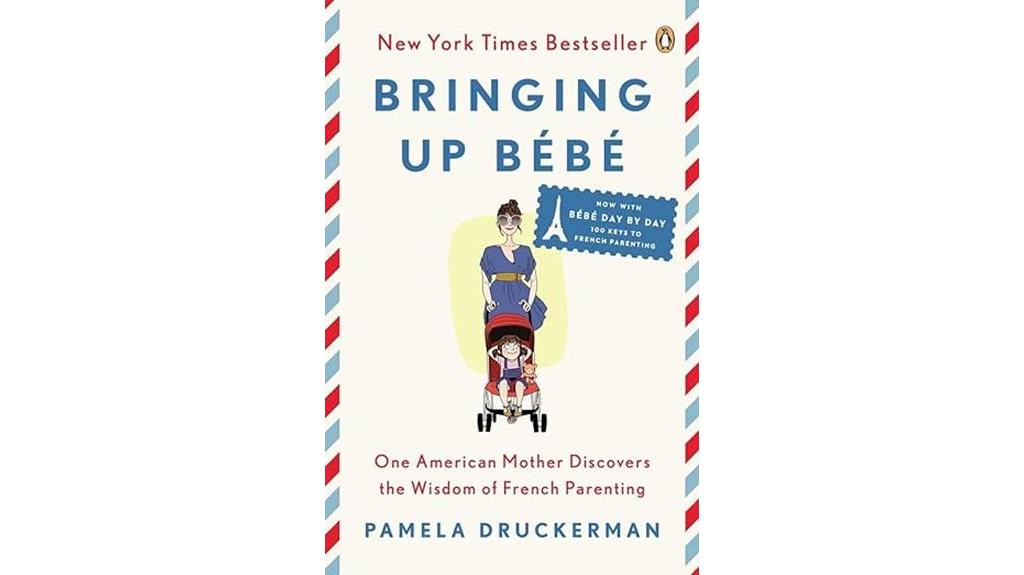
For those seeking a fresh perspective on parenting methods, 'Bringing Up Bébé' offers valuable insights into the wisdom of French parenting practices. This book, written by Pamela Druckerman, explores the contrast between French and American parenting approaches, highlighting the benefits of the former in fostering well-behaved children and confident mothers.
French parenting focuses on setting boundaries, promoting independence in children, and instilling patience and resilience from a young age. The emphasis on adult time in the evenings and teaching children to self-soothe for better sleep are practices that stand out.
Additionally, the French approach to food education, manners, and making mealtime enjoyable is enlightening. 'Bringing Up Bébé' provides practical strategies that can be applied in daily parenting routines, making it a valuable read for those interested in exploring different cultural parenting perspectives.
Best For: Parents looking to explore alternative parenting methods and gain insights into fostering well-behaved children and building confidence in themselves.
Pros:
- Offers a fresh perspective on parenting by contrasting French and American approaches.
- Provides practical strategies that can be applied in daily parenting routines.
- Emphasizes setting boundaries, promoting independence, and instilling patience and resilience in children.
Cons:
- May generalize parenting methods, leading to criticism from those with diverse parenting styles.
- Sparks debate and differing opinions among readers due to the comparison between French and American parenting styles.
- Some may find the emphasis on discipline and routine in French parenting methods too rigid for their liking.
French Kids Eat Everything: Raising Happy, Healthy Eaters
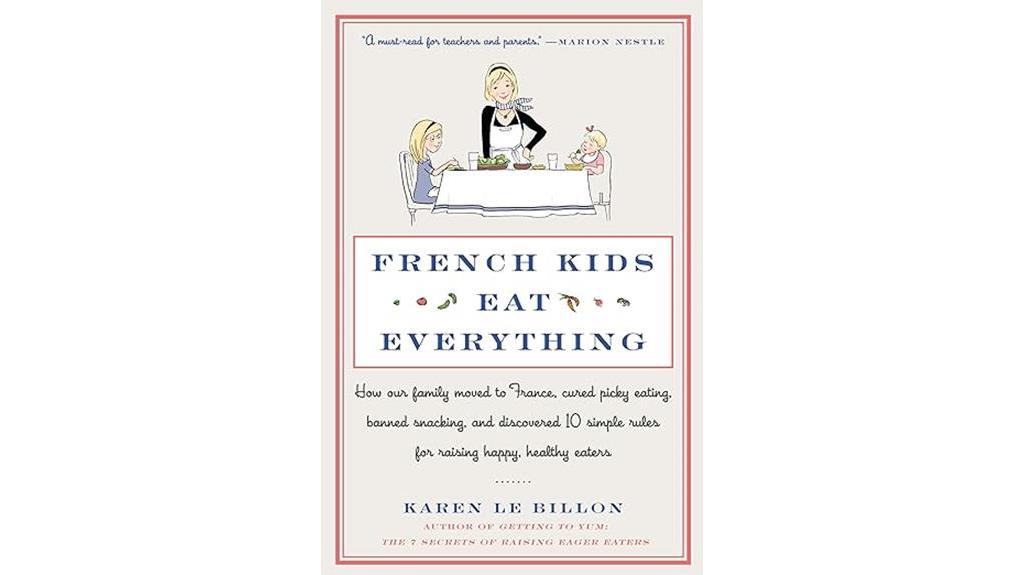
The 'French Kids Eat Everything' book offers practical strategies for fostering healthy eating habits in children and transforming family mealtimes into enjoyable experiences. Implementing the French eating habits outlined in the book has had a significant impact on my family's lifestyle.
By incorporating the concept of a four-course meal and encouraging my children to try new foods, I've witnessed positive changes in their eating behaviors. They now prefer healthier options and have learned to eat until satisfied, not overly full.
Embracing these principles hasn't only improved our food choices but also promoted better health and nutrition. Long-term effects include weight management, enhanced eating habits, and a positive shift in my child's food preferences.
I recommend exploring the French eating approach for a healthier, happier family life.
Best For: Families looking to improve their children's eating habits and transform mealtime experiences into enjoyable and healthier ones.
Pros:
- Practical strategies for fostering healthy eating habits in children.
- Positive impact on children's food preferences and eating behaviors.
- Promotes better health and nutrition through gradual changes in food choices.
Cons:
- Requires consistent effort and commitment to implement the French eating habits.
- Some children may initially resist trying new foods or adapting to the four-course meal concept.
- May be challenging to maintain the principles in busy or hectic family schedules.
French Parents Don't Give In: 100 Parenting Tips From Paris
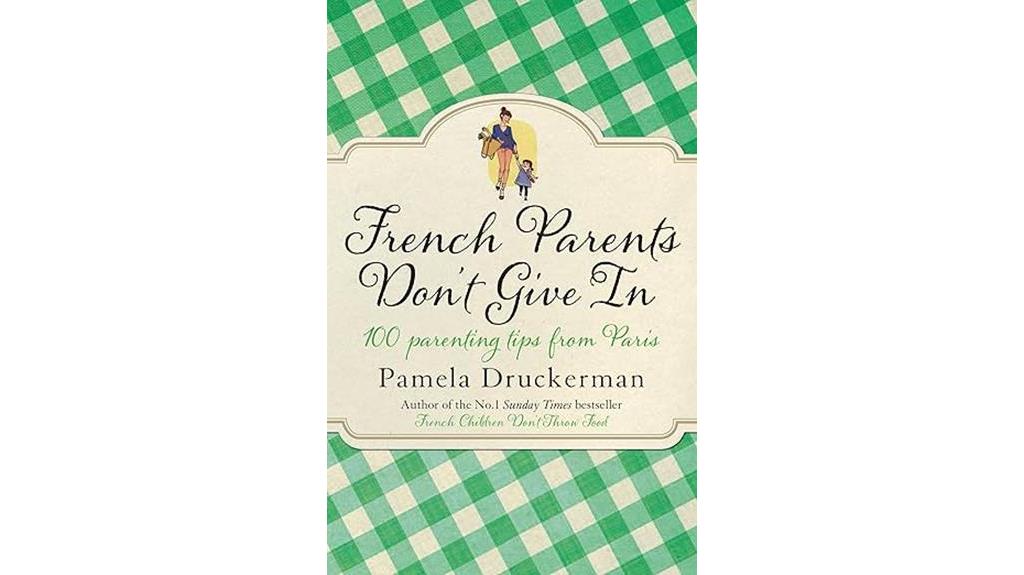
'French Parents Don't Give In: 100 Parenting Tips From Paris' offers practical advice and cultural insights that resonate with parents seeking a balanced and respectful approach to raising children. The book emphasizes the importance of consistency, respect, personal space, sociability, and encouragement in parenting. It acknowledges that children aren't always perfect but advocates for showing love and communicating this to them.
The book is praised for its entertaining and enlightening content, with tips presented in easily digestible paragraphs. It's particularly recommended for busy parents, as it allows for quick reading sessions. Readers appreciate the opportunity to compare parenting styles and customize the tips to suit their own households.
Overall, 'French Parents Don't Give In' provides a sensible and educational approach to child-rearing, offering valuable insights into French culture.
Best For: Parents seeking a practical and respectful approach to raising children with cultural insights.
Pros:
- Entertaining and enlightening content.
- Easily digestible tips in summary paragraphs.
- Valuable insights into French culture.
Cons:
- Higher price for Kindle edition.
- Limited recipes included.
- May not offer radically new parenting strategies.
French Twist: An American Moms Experiment in Parisian Parenting
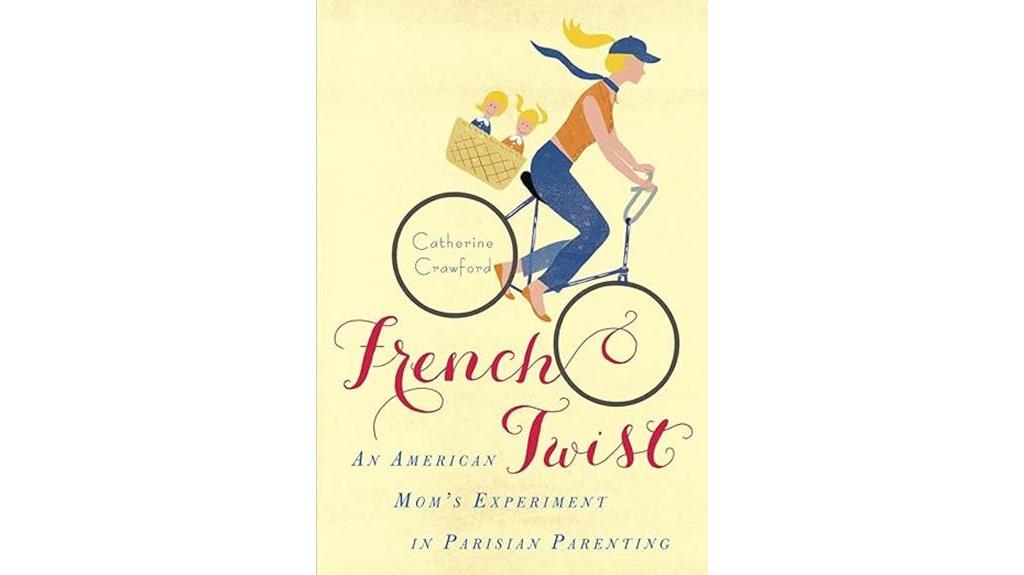
Ideal for parents seeking a balanced approach, 'French Twist: An American Moms Experiment in Parisian Parenting' offers practical insights into blending French and American parenting styles. The book has garnered positive reviews for its practical tips and lessons based on the author's experiences.
It stands out for addressing the 'HOW' element often missing in other parenting books, providing valuable guidance for parents looking to incorporate French techniques into their American parenting style. By contrasting French emphasis on respect, good manners, and discipline with American tendencies towards overindulgence and lack of boundaries, the book prompts readers to ponder the benefits of integrating French methods.
From instilling values like appreciation for good food and manners to dealing with societal expectations and setting boundaries, 'French Twist' equips parents with tools for maneuvering the challenges of raising well-rounded children.
Best For: Parents looking to incorporate French parenting techniques into their American parenting style for a more disciplined and respectful approach.
Pros:
- Practical insights and tips based on the author's experiences.
- Contrasts between French and American parenting styles for a well-rounded perspective.
- Emphasis on instilling values like appreciation for good food and manners.
Cons:
- May not fully address the individuality of each child's needs.
- Some readers may find the comparison of French and American parenting styles too generalized.
- Implementing strict boundaries and discipline may be challenging for parents used to a more lenient approach.
FRENCH CHILDREN DON'T THROW (B)
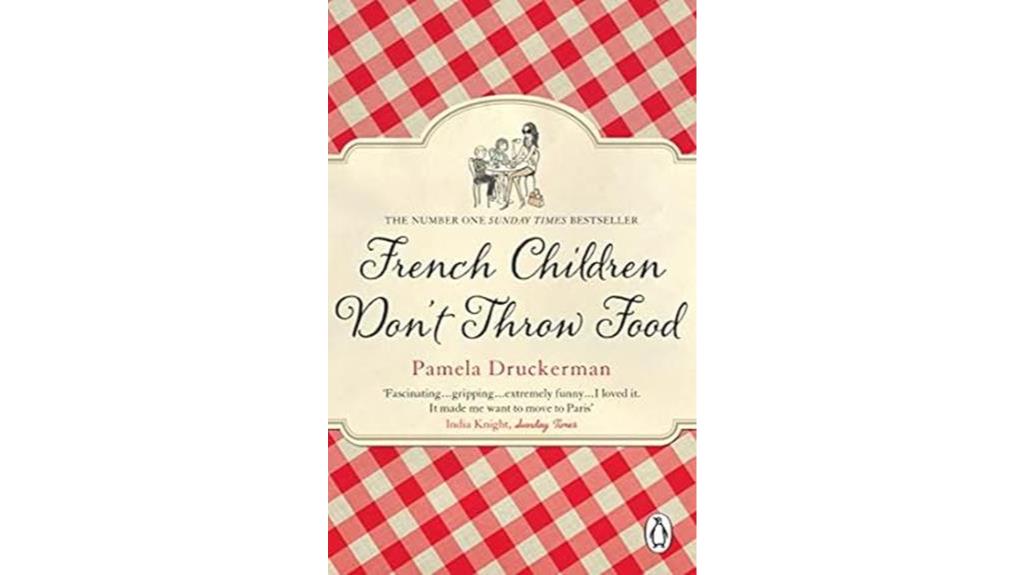
For parents seeking a fresh perspective on raising children, 'French Parenting Books' offers valuable insights into effective parenting techniques and cultural comparisons.
One notable aspect discussed in the book is the idea that French children don't throw tantrums. This concept highlights the emphasis on teaching children self-control and emotional regulation from a young age.
By setting clear boundaries and expectations while also allowing children the space to express themselves, French parenting aims to foster independence and respect.
The book provides practical tips on how parents can implement these strategies in their own parenting style, emphasizing the importance of consistency and patience.
Through personal anecdotes and research-based evidence, readers can gain a better understanding of how this approach can lead to more harmonious family dynamics.
Best For: Parents looking to explore a new parenting philosophy that emphasizes self-control and emotional regulation from a young age.
Pros:
- Offers valuable insights into effective parenting techniques and cultural comparisons.
- Provides practical tips on implementing French parenting strategies.
- Emphasizes fostering independence and respect in children.
Cons:
- May not align with all parenting styles or cultural beliefs.
- Requires consistency and patience to see desired results.
- Some parents may find it challenging to transition to a different parenting approach.
Baby Day by Day: 100 Keys to French Parenting
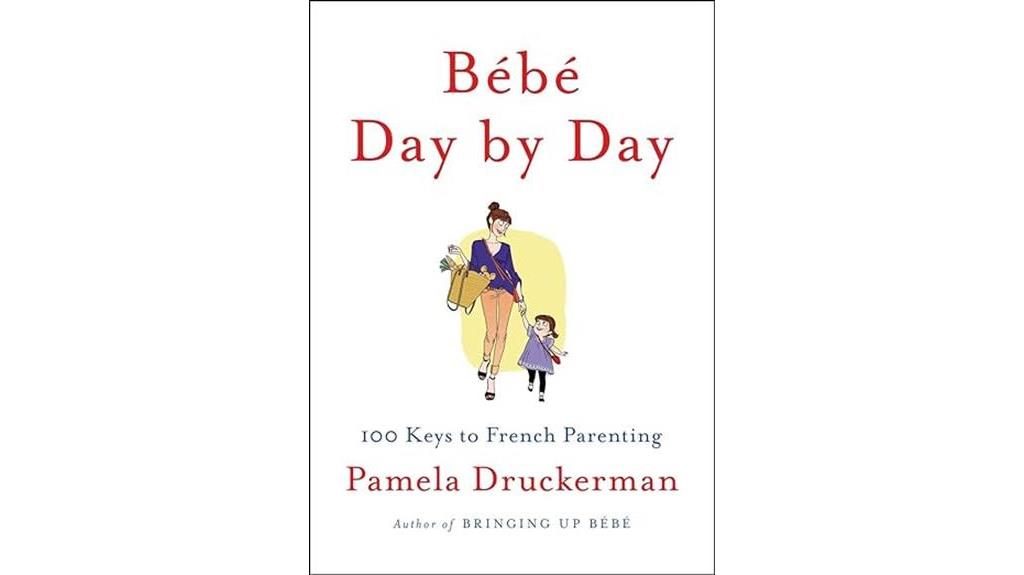
When seeking a practical and concise guide to French parenting principles, 'Baby Day by Day: 100 Keys to French Parenting' stands out as a valuable resource for new parents or those interested in a laid-back approach. This book offers an appealing and easy-to-read format, condensing essential French parenting concepts into short, shareable tidbits.
It serves as a refresher on the principles outlined in 'Bringing Up Bebe,' making it ideal for parents looking to deepen their understanding of French parenting techniques. 'Baby Day by Day' is often compared to its predecessor, being seen as a more condensed version that provides a quick read and serves as a convenient reference guide.
Readers have reported that this book influences their parenting views, providing confidence, insights, and a fun, informative perspective on applying French parenting principles in real-life situations.
Best For: New parents or individuals interested in a laid-back parenting approach.
Pros:
- Appeals to those seeking a practical and concise guide to French parenting.
- Condenses essential French parenting concepts into easily digestible tidbits.
- Provides insights and confidence for future parenting endeavors.
Cons:
- May be seen as a condensed version of 'Bringing Up Bebe' for readers seeking more in-depth content.
- Some readers may prefer a more detailed exploration of French parenting techniques.
- Limited availability in languages other than English may hinder accessibility for non-English speakers.
Bébé Gourmet: 100 French-Inspired Baby Food Recipes

One standout feature of 'Bébé Gourmet: 100 French-Inspired Baby Food Recipes' is its wide range of nutritious and delicious meal options suitable for parents seeking to raise adventurous eaters. The book offers an extensive selection of recipes ranging from first foods to meals for older eaters, including adults.
With insights from pediatric nutritionist and endocrinologist Dr. Jean Lalau Keraly, the recipes cater to different age milestones, encouraging the introduction of exciting flavors and textures to children. From easy puréed single-fruit meals to more complex combinations, 'Bébé Gourmet' guides parents on how to adapt recipes for older eaters, providing clear instructions and pictures for reference.
This book not only helps in expanding cooking skills but also boosts confidence in feeding children a diverse range of foods, making it a valuable resource for parents looking to introduce their babies to a variety of flavors.
Best For: Parents looking to introduce their babies to a diverse range of nutritious and delicious French-inspired baby food recipes.
Pros:
- Offers a wide range of recipes suitable for different age milestones.
- Provides clear instructions and pictures for easy adaptation and reference.
- Encourages adventurous eating habits in children through exciting flavors and textures.
Cons:
- May require some additional ingredients not commonly found in all households.
- Recipes might be time-consuming for parents with busy schedules.
- Not all children may enjoy the French-inspired flavors and textures.
More than Happy: The Wisdom of Amish Parenting
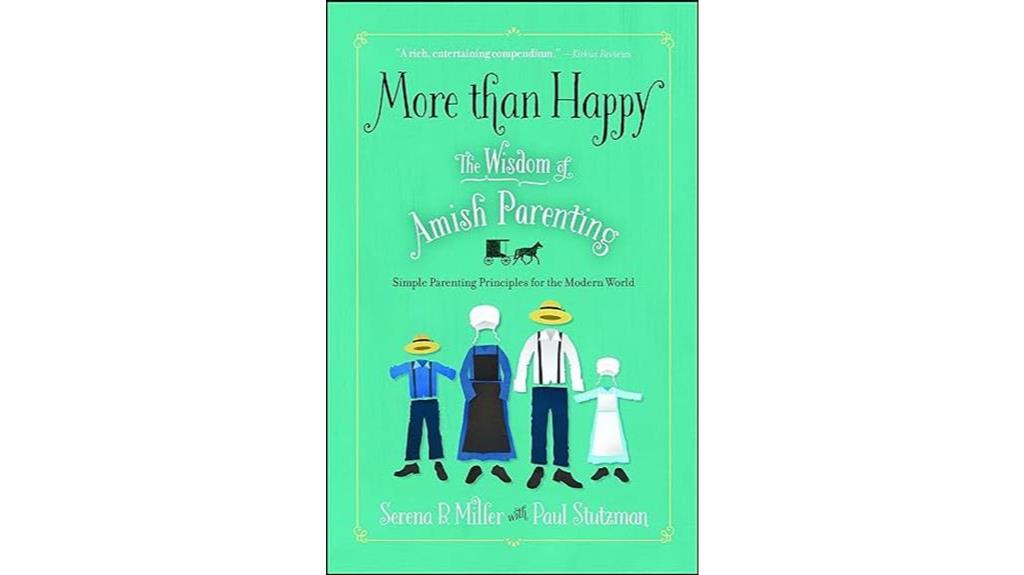
The insights from 'More than Happy: The Wisdom of Amish Parenting' offer a unique perspective on raising children that resonates with those seeking a simpler and values-driven approach in parenting. This book has gained praise for its practical advice and comparisons between Amish and modern parenting styles, emphasizing the importance of instilling values in children.
Readers find the emphasis on faith, family, and generosity as essential elements in child-rearing to be enlightening and invigorating. By delving into the Amish culture and values, the book provides a wealth of information on how traditional practices can be applied to modern family life.
Despite some criticisms regarding occasional repetitions or an excessive focus on personal opinions, 'More than Happy' is widely recommended for its thought-provoking content and valuable insights into raising well-adjusted children.
Best For: Parents looking for a values-driven and insightful approach to raising children that emphasizes faith, family, and generosity.
Pros:
- Practical advice on parenting with valuable insights into Amish culture and values.
- Thought-provoking content that encourages reflection and new ideas in child-rearing.
- Emphasis on instilling character and values in children for a meaningful and fulfilling upbringing.
Cons:
- Occasional repetitions in the content.
- Excessive focus on the authors' personal opinions may overshadow general advice.
- Some readers may find the comparisons between Amish and modern parenting styles limiting or not applicable to their own situations.
How Not to Calm a Child on a Plane: And Other Lessons in Parenting

For those seeking a humorous and relatable take on the challenges of parenting, 'How Not to Calm a Child on a Plane: And Other Lessons in Parenting' by Johanna Stein is the perfect choice. Readers have praised Stein's book for its engaging storytelling, humor, and ability to capture the essence of motherhood and parenthood.
The book is described as hilarious, relatable, and a great gift for mothers. Stein's writing style, known for its funny and exaggerated descriptions, has resonated with many, although some find it crass but enjoyable.
Readers appreciate the honesty and humor in Stein's storytelling, feeling connected and not alone in the journey of parenting. Whether you're a parent or not, this book is recommended for its wit, humor, and true-to-life perspectives on the rollercoaster ride of parenthood.
Best For: Parents and non-parents looking for a hilarious and relatable take on the ups and downs of parenthood.
Pros:
- Engaging storytelling filled with humor and wit.
- Captures the essence of motherhood and parenting in a relatable way.
- Offers a perfect gift option for mothers or new parents.
Cons:
- Some readers may find the humor a bit crass.
- The exaggerated descriptions may not appeal to all readers.
- Not suitable for those looking for a serious or instructional parenting book.
French Braid: A novel

When considering French Parenting Books, 'French Braid: A novel' by Anne Tyler offers an engaging exploration of family dynamics and relationships over 60 years. This novel, split into 8 chapters with a large font, spans 342 pages and was first published in 2022, starting in 2010.
Anne Tyler's writing style authentically portrays real-life situations with a focus on families and relationships seen through the characters in the story. Themes of forgiveness, judgment, and the limits of tolerance are woven into the narrative, with characters like Serena, James, Mercy, and Robin showcasing the intricacies of family interactions. The use of the French braid metaphor symbolizes the interconnectedness and nuances of family relationships in Tyler's storytelling.
Readers appreciate the relatable nature and character depth within the novel, praising Tyler's skill in crafting narratives that explore family dynamics and individual growth over time.
Best For: Readers who enjoy character-driven narratives exploring family dynamics and relationships with a focus on subtle storytelling.
Pros:
- Authentic portrayal of real-life situations and family interactions.
- Engaging exploration of themes like forgiveness, judgment, and tolerance.
- Skillful character development and relatable storytelling techniques.
Cons:
- Some concerns about similarities to the author's previous works.
- May not appeal to readers seeking fast-paced plots.
- Limited action scenes or high-drama moments.
Loving the Little Years: Motherhood in the Trenches
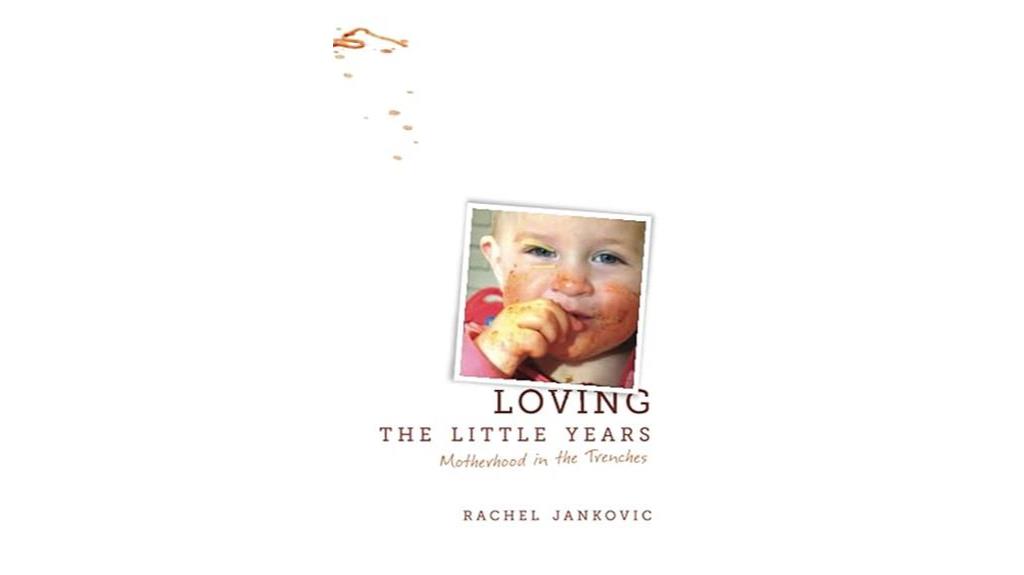
Optimizing my parenting approach with practical and grace-based advice, 'Loving the Little Years: Motherhood in the Trenches' resonates deeply with the challenges and joys of raising young children. Authored by Rachel Jankovic, this book offers a collection of short vignettes that provide counsel and encouragement to Christian parents, especially mothers, journeying through the process of raising children.
Readers, including husbands, fathers, and first-time moms, have praised the book for its practical insights and wisdom tailored for parents of small children. With a focus on grace-based parenting and addressing heart issues rather than mere behavior management, 'Loving the Little Years' encourages parents to embrace motherhood as a high calling.
Through storytelling and practical scenarios, the book equips parents with strategies to manage sibling conflicts, prioritize relationships over possessions, and nurture their children's spiritual growth.
Best For: Parents seeking practical and grace-based advice for navigating the challenges and joys of raising young children.
Pros:
- Offers practical insights and wisdom tailored for parents of small children.
- Emphasizes grace-based parenting and addressing heart issues over behavior management.
- Equips parents with strategies for managing sibling conflicts, prioritizing relationships, and nurturing children's spiritual growth.
Cons:
- May not provide detailed solutions for specific parenting challenges.
- Focus on Christian parenting may not resonate with all readers.
- Short vignettes format may not appeal to those looking for in-depth analysis on parenting topics.
Five French Hens: A warm and uplifting feel-good novel from USA Today Bestseller Judy Leigh

The novel 'Five French Hens' by Judy Leigh offers a heartwarming exploration of life, love, and friendship for readers seeking an uplifting and relatable story. In this feel-good novel, five women in their 70s navigate challenges and discover what truly matters in life.
The characters, including Jen, Tess, Rose, Della, and Pam, come together over aqua fit classes and set out on a journey of self-discovery in Paris. Judy Leigh, a USA Today Bestselling author, skillfully weaves themes of love, friendship, and personal growth into the narrative, creating a compelling and engaging read.
Readers praise the book for its well-developed characters, humor, and poignant life lessons that resonate with women of all ages. 'Five French Hens' is recommended as an entertaining and heartwarming novel that celebrates the joys of friendship and embracing life's adventures.
Best For: Readers looking for a heartwarming and uplifting novel centered around themes of friendship, love, and rediscovery with relatable older protagonists.
Pros:
- Engaging storytelling that resonates with women of all ages.
- Well-developed characters and humor that adds depth to the narrative.
- Poignant life lessons and positive messages about embracing life's adventures.
Cons:
- Some readers may find the storyline predictable.
- Limited focus on certain character backgrounds and experiences.
- The fortune teller element may feel cliché to some readers.
When in French: Love in a Second Language

For those seeking a blend of personal narrative and linguistic insights in exploring cross-cultural relationships, 'When In French' by Lauren Collins offers an engaging and informative read. The book explores the author's experiences with her French husband, Olivier, unraveling the complexities and delights of managing a relationship in a second language.
Through seven essays, Collins delves into the challenges and rewards of immersing oneself in a divergent cultural experience. Beyond just language, the book touches on history, linguistics, and the Academie Francais, providing readers with an enchanting journey through the nuances of cross-cultural love.
While some readers praise the charm and wit of the book, others critique its verbosity and academic tone. Overall, 'When In French' remains a unique and thought-provoking exploration of love in a second language.
Best For: Readers interested in exploring cross-cultural relationships through a blend of personal narrative and linguistic insights.
Pros:
- Offers a unique perspective on managing relationships in a second language.
- Provides engaging insights into history, linguistics, and cultural immersion.
- The mix of personal storytelling and academic exploration makes for a thought-provoking read.
Cons:
- Some readers may find the focus overly academic and verbose.
- Criticisms include a lack of focus on the love story aspect and negative portrayals of certain elements.
- Suggestions for improvement include trimming down content and providing citations for presented facts.
I Spy a Great Reader: Unlock the Literary Secret for Your Child
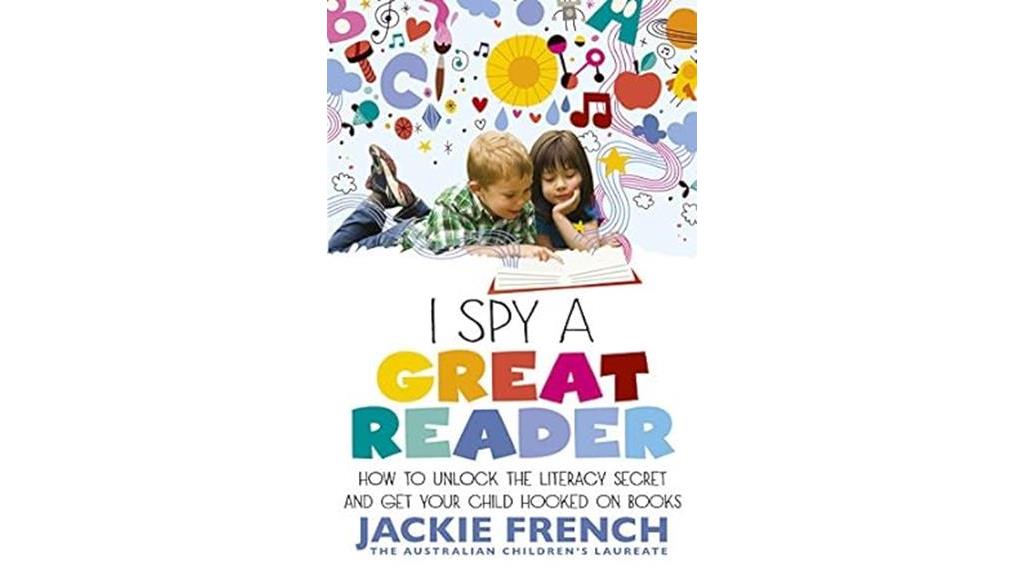
When seeking to reveal the literary secret for your child, 'I Spy a Great Reader: How to Reveal the Literary Secret and Get Your Child Hooked on Books' from the French Parenting Books collection proves to be a valuable resource.
This book offers practical insights for parents and educators on fostering a love for reading in children. While it introduces the concept of 'learning styles,' which may not be universally accepted, the emphasis on adapting information delivery methods to suit different learners is commendable.
Despite some critiques regarding the accuracy of the discussion on learning styles, the overall message of promoting diverse learning approaches is essential for effective education.
Parents and educators can benefit from the book's ideas to support children in cultivating a passion for reading and literacy.
Best For: Parents and educators seeking practical insights on fostering a love for reading in children.
Pros:
- Offers practical insights for promoting reading habits among children.
- Emphasizes the importance of adapting information delivery methods to cater to different learners' needs.
- Provides valuable ideas that can be implemented in practice.
Cons:
- Discusses the concept of 'learning styles' which may not align with traditional teaching methods.
- Some critiques regarding the accuracy of the discussion on learning styles.
- Could benefit from further exploration of evidence-based educational practices.
Factors to Consider When Choosing French Parenting Books

When selecting French parenting books, it's crucial to take into account key selection criteria, examine the content of the book, and take into consideration reader engagement.
These elements can offer valuable insights into the practical applications of the book and its potential impact on your parenting approach.
Key Selection Criteria
Taking into account the author's expertise in parenting or child development is crucial when selecting French parenting books. It guarantees that the information provided is credible and based on sound principles.
Another key criterion to take into consideration is finding books that align with your parenting style and values. This helps in implementing the strategies and tips effectively in your everyday parenting journey.
Checking reviews and ratings from trusted sources or fellow parents can also guide you in choosing the right book. Look for practical tips and strategies that are easy to incorporate into your routine.
Additionally, consider the author's background and expertise in child development and education to ensure reliable information. It's beneficial to select books that resonate with your personal parenting philosophy and values, ensuring they complement your approach.
Moreover, seeking out French parenting books that cover various topics like early childhood development, discipline, and communication strategies can provide a well-rounded perspective on parenting.
Book Content Analysis
In exploring French parenting books, one should focus on the book's exploration of French parenting methods, practical advice for daily implementation, and cultural insights.
When selecting a book, consider how it explores French parenting techniques like discipline, routines, and child-rearing philosophies. Look for practical tips that can be easily applied in your daily life to incorporate these methods into your own parenting style.
Additionally, seek out books that provide cultural insights and comparisons between French and American parenting styles, offering a deeper understanding of different approaches. Consider recommendations and personal experiences shared by the author or other parents who've put the book's principles into practice.
Evaluate how the book impacts parenting strategies, child behavior, and overall family dynamics based on reader reviews and feedback. By analyzing these factors, you can choose a French parenting book that best aligns with your goals and parenting philosophy.
Reader Engagement Factors
Exploring French parenting books involves considering various reader engagement factors that can influence one's choice when selecting a book. Factors such as relatable anecdotes, practical tips, and humor play a significant role in keeping readers interested and invested in the content.
The use of storytelling, personal experiences, and real-life examples can enhance reader engagement by making the information more relatable and engaging. Additionally, providing actionable advice, clear explanations, and relevant information increases reader engagement and retention.
Interactive elements like reflective questions and prompts for self-assessment can also make parenting books more engaging. The writing style, tone, structure of the content, and relevance of the information to the reader's experiences are essential aspects that impact reader engagement.
Compelling storytelling, relatable characters, interactive elements, and engaging design elements like illustrations and layouts can further enhance reader engagement in French parenting books. Incorporating activities, questions, and prompts for reflection keeps readers actively involved and interested in the content.
Practical Application Insights
When considering French parenting books, it's essential to prioritize practical application insights that focus on setting boundaries and promoting independence in children. French parenting emphasizes consistency, respect, and encouragement as fundamental elements for successful parenting.
These books offer strategies for instilling patience, teaching manners, and promoting healthy eating habits. Additionally, tips for managing sibling conflicts, fostering sociability, and promoting self-control are commonly found in French parenting literature.
Practical application insights in French parenting books provide guidance for parents on creating a structured, loving, and respectful environment for children. They often include tips on implementing parenting techniques, fostering independence, and promoting healthy habits.
These insights are based on research, cultural practices, and expert advice, offering actionable advice and hands-on activities to help apply the principles of French parenting in real-life scenarios. Overall, French parenting books equip parents with practical solutions for common parenting challenges, emphasizing the importance of boundaries, open communication, and a strong parent-child relationship.
Impact on Parenting
Considering the impact of French parenting books on my approach, I prioritize selecting literature that aligns with my parenting values and goals.
French parenting books can offer valuable insights into strategies that promote patience, setting boundaries, and fostering independence in children. They emphasize creating a nurturing environment based on respect, discipline, and healthy habits, such as family mealtime and diverse food exposure.
By adopting a structured and authoritative parenting style inspired by French techniques, parents may witness improvements in behavior and relationships with their children. These books also stress the importance of instilling responsibility and self-control in children from a young age through clear boundaries and expectations.
Additionally, French parenting literature encourages promoting self-reliance and adaptability in children to navigate various social situations. Exploring alternative child-rearing practices from French parenting books can help parents enhance their children's emotional intelligence, cognitive development, and overall well-being.
Cultural Relevance
Understanding the cultural relevance of French parenting books is vital when selecting literature to align with your parenting values and goals. French parenting books often emphasize cultural aspects like respect, discipline, and family dynamics unique to French culture. By delving into these books, readers can gain insights into traditional values, social norms, and parenting philosophies specific to France.
It's important to recognize that cultural nuances play a significant role in shaping parenting practices, and embracing these differences can enrich one's own parenting journey. French parenting books may contrast with American or other parenting styles, shedding light on the diverse approaches to child-rearing across different cultures. They highlight values such as independence, respect, and discipline, showcasing how these principles are integrated into parenting in France.
Frequently Asked Questions
Can French Parenting Techniques Be Applied to Children of All Ages?
French parenting techniques can be adapted for children of all ages. The principles of setting boundaries, fostering independence, and promoting respect are universal.
However, the application may vary based on the child's developmental stage. Younger children may require more hands-on guidance, while older children benefit from increased autonomy within structured limits.
Flexibility and personalized adjustments are key to successfully implementing French parenting methods across different age groups.
How Do French Parenting Books Address Discipline and Boundaries?
French parenting books address discipline and boundaries by emphasizing consistent communication, setting clear expectations, and implementing logical consequences.
They often highlight the importance of authoritative parenting, which balances warmth and structure.
These books provide practical strategies for handling challenging behaviors, promoting independence, and fostering respect between parents and children.
Are There Specific Tips for Introducing French Food to Picky Eaters?
When introducing French food to picky eaters, start with simple dishes like crepes or croissants to familiarize them with the flavors.
Gradually introduce more traditional French dishes like ratatouille or quiche, emphasizing the importance of trying new foods.
Get children involved in meal preparation to pique their interest and make them more willing to try different foods.
Encourage a positive attitude towards food exploration to help expand their palate over time.
Do These Books Discuss Cultural Differences in Parenting Approaches?
Yes, these books explore cultural differences in parenting approaches, offering valuable insights into how French parenting styles contrast with others.
They discuss topics like discipline, mealtime routines, and independence fostering.
By examining these cultural nuances, readers can gain a deeper understanding of the underlying principles that shape French parenting practices and how they may differ from their own cultural norms.
This comparative analysis can be enlightening and informative for parents seeking to broaden their parenting perspectives.
How Can Non-French-Speaking Parents Benefit From These Books?
As a non-French-speaking parent, I can benefit from these books by focusing on universal parenting principles rather than language barriers.
Think of these books as a roadmap, guiding us through the diverse terrain of parenting ideologies.
By extracting key concepts and adapting them to our cultural context, we can enrich our parenting toolkit.
Embracing the essence of French parenting, regardless of language fluency, allows us to cultivate a nurturing and supportive environment for our children.
Are French Parenting Books Also Helpful for Parenting Teenagers?
Looking for the best parenting books for teenagers? Many parents have found that French parenting books offer valuable insights and techniques that can be applied to parenting teenagers as well. While not specifically focused on teenage years, these books can provide helpful advice on raising children with respect and boundaries.
Conclusion
To sum up, it's worth noting that French parenting books offer valuable insights and strategies for raising well-rounded children.
One interesting statistic to keep in mind is that French children typically have a lower rate of obesity compared to American children, which highlights the importance of instilling healthy eating habits from a young age.
By incorporating the principles from these books into your own parenting style, you can help create a nurturing and supportive environment for your child's physical, emotional, and intellectual development.
-

 Parenting Styles1 week ago
Parenting Styles1 week agoWorst Parenting Style: Impact on Child Development
-

 Parenting Styles1 week ago
Parenting Styles1 week ago2023 Indiana Parenting Time Guidelines Update
-

 Vetted7 days ago
Vetted7 days ago15 Best Books on Step Parenting Every Blended Family Needs to Read
-

 Parenting Tips6 days ago
Parenting Tips6 days agoUnequal Responsibilities: When One Parent Does All the Parenting
-

 Parenting Tips1 week ago
Parenting Tips1 week agoFostering Love: How Much Do You Get Paid for Foster Parenting?
-

 Vetted6 days ago
Vetted6 days ago15 Best Parenting Books of All Time Every Parent Should Read
-

 Vetted19 hours ago
Vetted19 hours ago15 Best Co-Parenting Books Every Parent Should Read for Successful Co-Parenting
-

 Vetted6 days ago
Vetted6 days ago15 Best Books for Gentle Parenting Every Parent Should Read

















